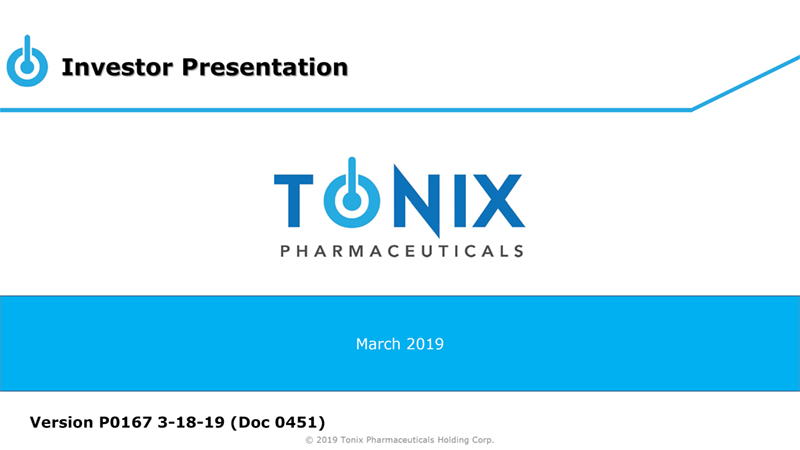
Tonix Pharmaceuticals Holding Corp. 8-K
Exhibit 99.02

Investor Presentation March 2019 Version P0167 3-18-19 (Doc 0451) © 2019 Tonix Pharmaceuticals Holding Corp.
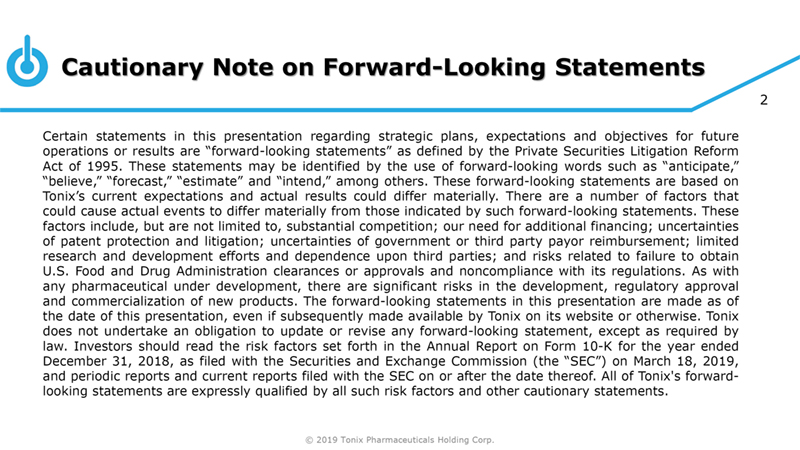
Cautionary Note on Forward Looking Statements 2 Certain statements in this presentation regarding strategic plans, expectations and objectives for future operations or results are “forward-looking statements” as defined by the Private Securities Litigation Reform Act of 1995. These statements may be identified by the use of forward-looking words such as “anticipate,” “believe,” “forecast,” “estimate” and “intend,” among others. These forward-looking statements are based on Tonix’s current expectations and actual results could differ materially. There are a number of factors that could cause actual events to differ materially from those indicated by such forward-looking statements. These factors include, but are not limited to, substantial competition; our need for additional financing; uncertainties of patent protection and litigation; uncertainties of government or third party payor reimbursement; limited research and development efforts and dependence upon third parties; and risks related to failure to obtain U.S. Food and Drug Administration clearances or approvals and noncompliance with its regulations. As with any pharmaceutical under development, there are significant risks in the development, regulatory approval and commercialization of new products. The forward-looking statements in this presentation are made as of the date of this presentation, even if subsequently made available by Tonix on its website or otherwise. Tonix does not undertake an obligation to update or revise any forward-looking statement, except as required by law. Investors should read the risk factors set forth in the Annual Report on Form 10-K for the year ended December 31, 2018, as filed with the Securities and Exchange Commission (the “SEC”) on March 18, 2019, and periodic reports and current reports filed with the SEC on or after the date thereof. All of Tonix’s forward-looking statements are expressly qualified by all such risk factors and other cautionary statements. © 2019 Tonix Pharmaceuticals Holding Corp.
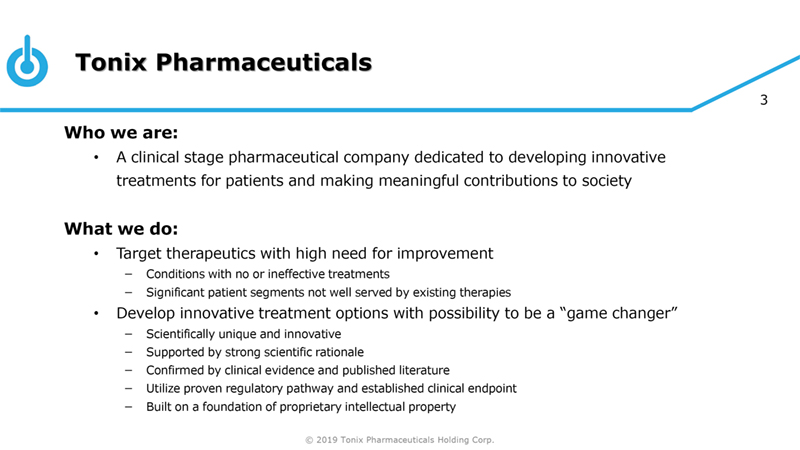
Tonix Pharmaceuticals 3 Who we are: • A clinical stage pharmaceutical company dedicated to developing innovative treatments for patients and making meaningful contributions to society What we do: • Target therapeutics with high need for improvement Conditions with no or ineffective treatments Significant patient segments not well served by existing therapies • Develop innovative treatment options with possibility to be a “game changer” Scientifically unique and innovative Supported by strong scientific rationale Confirmed by clinical evidence and published literature Utilize proven regulatory pathway and established clinical endpoint Built on a foundation of proprietary intellectual property © 2019 Tonix Pharmaceuticals Holding Corp.
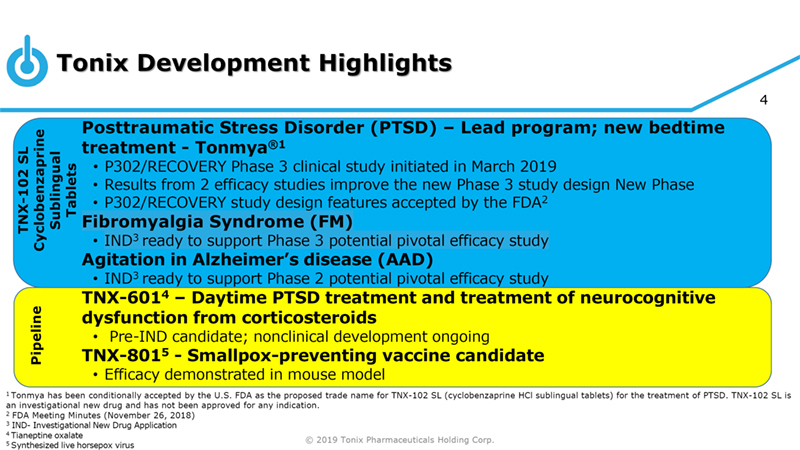
Tonix Development Highlights 4 Posttraumatic Stress Disorder (PTSD) – Lead program; new bedtime treatment - Tonmya®1 • P302/RECOVERY Phase 3 clinical study initiated in March 2019 • Results from 2 efficacy studies improve the new Phase 3 study design New Phase Tablets • P302/RECOVERY study design features accepted by the FDA2 TNX-102 SL Sublingual Fibromyalgia Syndrome (FM) Cyclobenzaprine • IND3 ready to support Phase 3 potential pivotal efficacy study Agitation in Alzheimer’s disease (AAD) • IND3 ready to support Phase 2 potential pivotal efficacy study TNX-6014 – Daytime PTSD treatment and treatment of neurocognitive dysfunction from corticosteroids • Pre-IND candidate; nonclinical development ongoing Pipeline TNX-8015 - Smallpox-preventing vaccine candidate • Efficacy demonstrated in mouse model 1 Tonmya has been conditionally accepted by the U.S. FDA as the proposed trade name for TNX-102 SL (cyclobenzaprine HCl sublingual tablets) for the treatment of PTSD. TNX-102 SL is an investigational new drug and has not been approved for any indication. 2 FDA Meeting Minutes (November 26, 2018) 3 IND- Investigational New Drug Application 4 Tianeptine oxalate © 2019 Tonix Pharmaceuticals Holding Corp. 5 Synthesized live horsepox virus
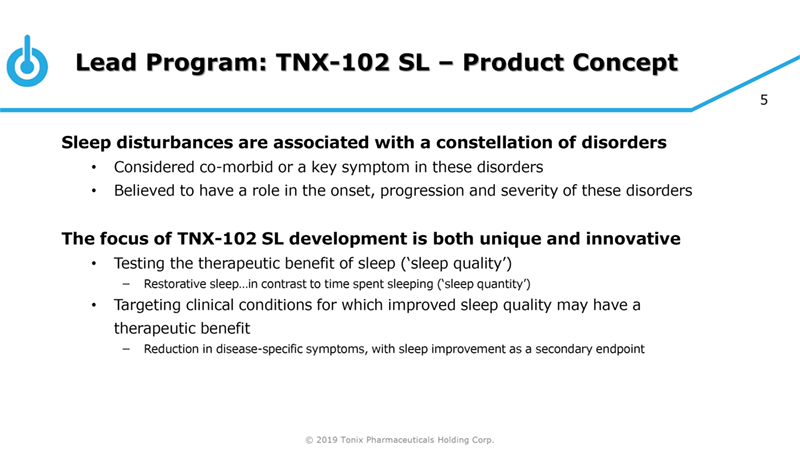
Lead Program: TNX 102 SL – Product Concept 5 Sleep disturbances are associated with a constellation of disorders • Considered co-morbid or a key symptom in these disorders • Believed to have a role in the onset, progression and severity of these disorders The focus of TNX-102 SL development is both unique and innovative • Testing the therapeutic benefit of sleep (‘sleep quality’) Restorative sleep…in contrast to time spent sleeping (‘sleep quantity’) • Targeting clinical conditions for which improved sleep quality may have a therapeutic benefit Reduction in disease-specific symptoms, with sleep improvement as a secondary endpoint © 2019 Tonix Pharmaceuticals Holding Corp.
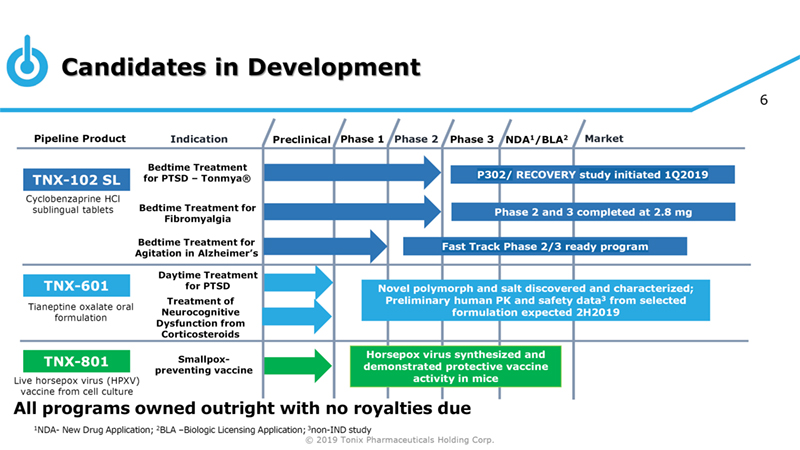
Candidates in Development 6 Pipeline Product Indication Preclinical Phase 1 Phase 2 Phase 3 NDA1/BLA2 Market Bedtime Treatment TNX-102 SL for PTSD – Tonmya® P302/ RECOVERY study initiated 1Q2019 Cyclobenzaprine HCl sublingual tablets Bedtime Treatment for Phase 2 and 3 completed at 2.8 mg Fibromyalgia Bedtime Treatment for Fast Track Phase 2/3 ready program Agitation in Alzheimer’s Daytime Treatment TNX-601 for PTSD Novel polymorph and salt discovered and characterized; Treatment of Preliminary human PK and safety data3 from selected Tianeptine oxalate oral Neurocognitive formulation expected 2H2019 formulation Dysfunction from Corticosteroids TNX-801 Smallpox- Horsepox virus synthesized and preventing vaccine demonstrated protective vaccine Live horsepox virus (HPXV) activity in mice vaccine from cell culture All programs owned outright with no royalties due 1NDA- New Drug Application; 2BLA –Biologic Licensing Application;3non-IND study © 2019 Tonix Pharmaceuticals Holding Corp.
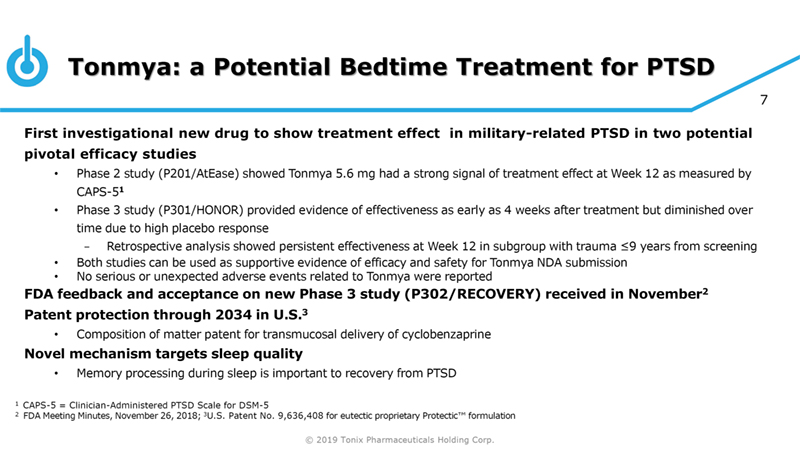
Tonmya: a Potential Bedtime Treatment for PTSD 7 First investigational new drug to show treatment effect in military-related PTSD in two potential pivotal efficacy studies • Phase 2 study (P201/AtEase) showed Tonmya 5.6 mg had a strong signal of treatment effect at Week 12 as measured by CAPS-51 • Phase 3 study (P301/HONOR) provided evidence of effectiveness as early as 4 weeks after treatment but diminished over time due to high placebo response Retrospective analysis showed persistent effectiveness at Week 12 in subgroup with trauma 9 years from screening • Both studies can be used as supportive evidence of efficacy and safety for Tonmya NDA submission • No serious or unexpected adverse events related to Tonmya were reported FDA feedback and acceptance on new Phase 3 study (P302/RECOVERY) received in November2 Patent protection through 2034 in U.S.3 • Composition of matter patent for transmucosal delivery of cyclobenzaprine Novel mechanism targets sleep quality • Memory processing during sleep is important to recovery from PTSD 1 CAPS-5 = Clinician-Administered PTSD Scale for DSM-5 2 FDA Meeting Minutes, November 26, 2018; 3U.S. Patent No. 9,636,408 for eutectic proprietary Protectic™ formulation © 2019 Tonix Pharmaceuticals Holding Corp.
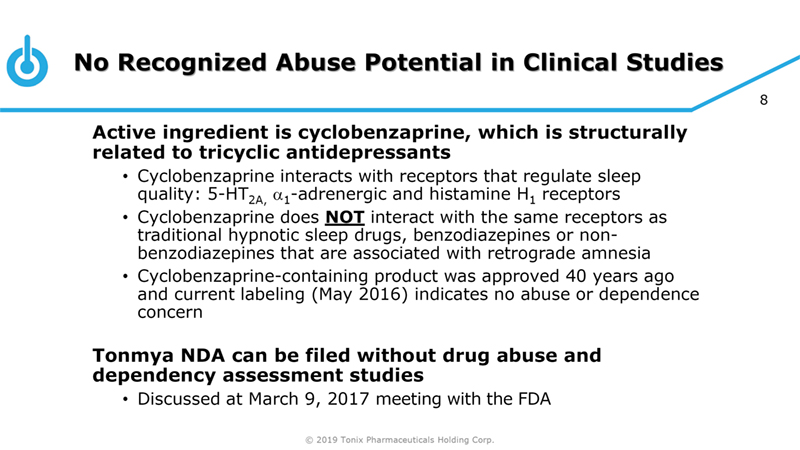
No Recognized Abuse Potential in Clinical Studies 8 Active ingredient is cyclobenzaprine, which is structurally related to tricyclic antidepressants • Cyclobenzaprine interacts with receptors that regulate sleep quality: 5-HT2A, 1-adrenergic and histamine H1 receptors • Cyclobenzaprine does NOT interact with the same receptors as traditional hypnotic sleep drugs, benzodiazepines or non-benzodiazepines that are associated with retrograde amnesia • Cyclobenzaprine-containing product was approved 40 years ago and current labeling (May 2016) indicates no abuse or dependence concern Tonmya NDA can be filed without drug abuse and dependency assessment studies • Discussed at March 9, 2017 meeting with the FDA © 2019 Tonix Pharmaceuticals Holding Corp.
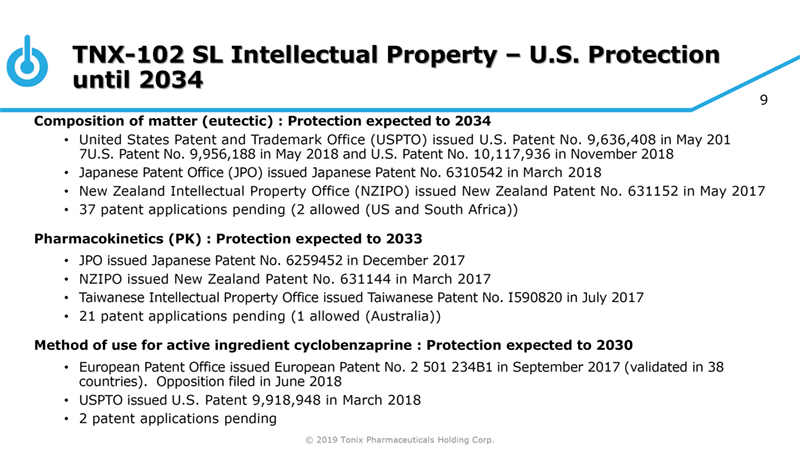
TNX 102 SL Intellectual Property – U.S. Protection until 2034 9 Composition of matter (eutectic) : Protection expected to 2034 • United States Patent and Trademark Office (USPTO) issued U.S. Patent No. 9,636,408 in May 201 7U.S. Patent No. 9,956,188 in May 2018 and U.S. Patent No. 10,117,936 in November 2018 • Japanese Patent Office (JPO) issued Japanese Patent No. 6310542 in March 2018 • New Zealand Intellectual Property Office (NZIPO) issued New Zealand Patent No. 631152 in May 2017 • 37 patent applications pending (2 allowed (US and South Africa)) Pharmacokinetics (PK) : Protection expected to 2033 • JPO issued Japanese Patent No. 6259452 in December 2017 • NZIPO issued New Zealand Patent No. 631144 in March 2017 • Taiwanese Intellectual Property Office issued Taiwanese Patent No. I590820 in July 2017 • 21 patent applications pending (1 allowed (Australia)) Method of use for active ingredient cyclobenzaprine : Protection expected to 2030 • European Patent Office issued European Patent No. 2 501 234B1 in September 2017 (validated in 38 countries). Opposition filed in June 2018 • USPTO issued U.S. Patent 9,918,948 in March 2018 • 2 patent applications pending © 2019 Tonix Pharmaceuticals Holding Corp.
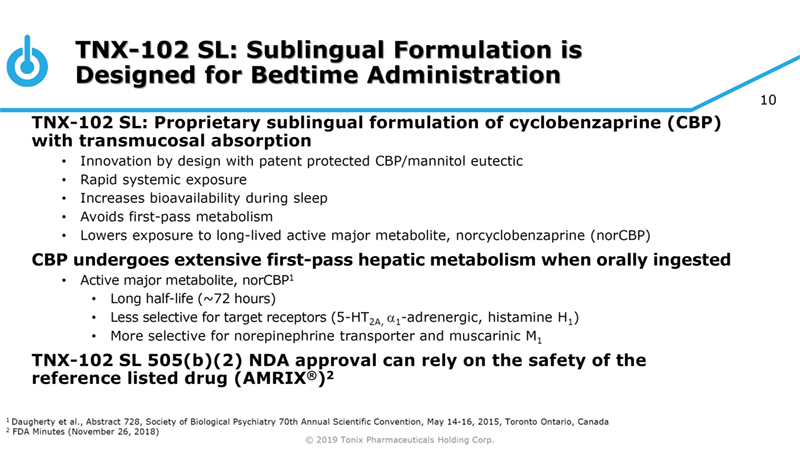
TNX 102 SL: Sublingual Formulation is Designed for Bedtime Administration 10 TNX-102 SL: Proprietary sublingual formulation of cyclobenzaprine (CBP) with transmucosal absorption • Innovation by design with patent protected CBP/mannitol eutectic • Rapid systemic exposure • Increases bioavailability during sleep • Avoids first-pass metabolism • Lowers exposure to long-lived active major metabolite, norcyclobenzaprine (norCBP) CBP undergoes extensive first-pass hepatic metabolism when orally ingested • Active major metabolite, norCBP1 • Long half-life (~72 hours) • Less selective for target receptors (5-HT2A, 1-adrenergic, histamine H1) • More selective for norepinephrine transporter and muscarinic M1 TNX-102 SL 505(b)(2) NDA approval can rely on the safety of the reference listed drug (AMRIX®)2 1 Daugherty et al., Abstract 728, Society of Biological Psychiatry 70th Annual Scientific Convention, May 14-16, 2015, Toronto Ontario, Canada 2 FDA Minutes (November 26, 2018) © 2019 Tonix Pharmaceuticals Holding Corp.
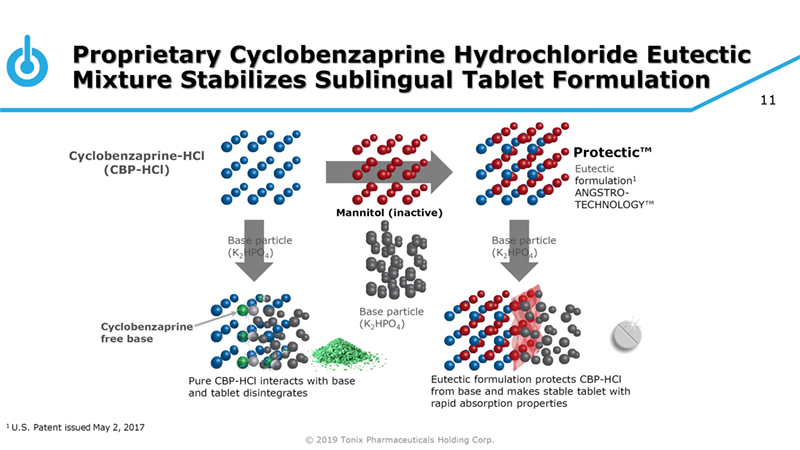
Proprietary Cyclobenzaprine Hydrochloride Eutectic Mixture Stabilizes Sublingual Tablet Formulation 11 Cyclobenzaprine-HCl Protectic™ (CBP-HCl) Eutectic formulation1 ANGSTRO-TECHNOLOGY™ Mannitol (inactive) Base particle Base particle (K 2HPO4) (K2HPO4) Base particle Cyclobenzaprine (K2HPO4) free base Pure CBP-HCl interacts with base Eutectic formulation protects CBP-HCl and tablet disintegrates from base and makes stable tablet with rapid absorption properties 1 U.S. Patent issued May 2, 2017 © 2019 Tonix Pharmaceuticals Holding Corp.
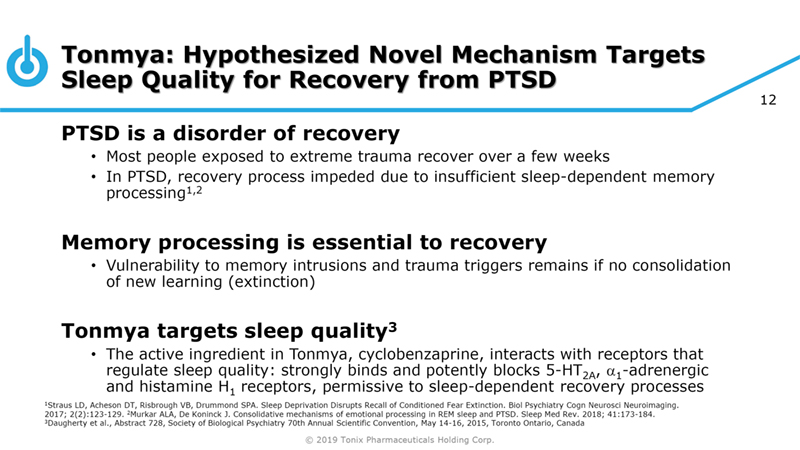
Tonmya: Hypothesized Novel Mechanism Targets Sleep Quality for Recovery from PTSD 12 PTSD is a disorder of recovery • Most people exposed to extreme trauma recover over a few weeks • In PTSD, recovery process impeded due to insufficient sleep-dependent memory processing1,2 Memory processing is essential to recovery • Vulnerability to memory intrusions and trauma triggers remains if no consolidation of new learning (extinction) Tonmya targets sleep quality3 • The active ingredient in Tonmya, cyclobenzaprine, interacts with receptors that regulate sleep quality: strongly binds and potently blocks 5-HT2A, 1-adrenergic and histamine H1 receptors, permissive to sleep-dependent recovery processes 1Straus LD, Acheson DT, Risbrough VB, Drummond SPA. Sleep Deprivation Disrupts Recall of Conditioned Fear Extinction. Biol Psychiatry Cogn Neurosci Neuroimaging. 2017; 2(2):123-129. 2Murkar ALA, De Koninck J. Consolidative mechanisms of emotional processing in REM sleep and PTSD. Sleep Med Rev. 2018; 41:173-184. 3Daugherty et al., Abstract 728, Society of Biological Psychiatry 70th Annual Scientific Convention, May 14-16, 2015, Toronto Ontario, Canada © 2019 Tonix Pharmaceuticals Holding Corp.
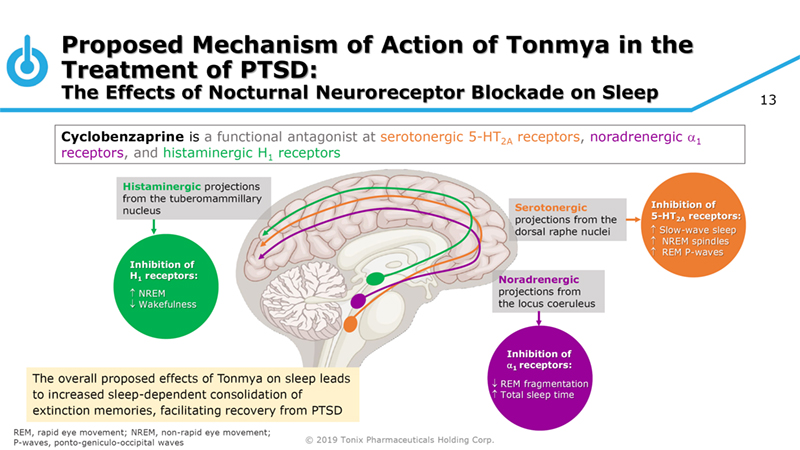
Proposed Mechanism of Action of Tonmya in the Treatment of PTSD: The Effects of Nocturnal Neuroreceptor Blockade on Sleep 13 Cyclobenzaprine is a functional antagonist at serotonergic 5-HT2A receptors, noradrenergic 1 receptors, and histaminergic H1 receptors Histaminergic projections from the tuberomammillary Serotonergic Inhibition of nucleus projections from the HT2A receptors: dorsal raphe nuclei ↑Slow wave sleep ↑ NREM spindles ↑ REM waves Inhibition of H receptors: Noradrenergic ↑ NREM projections from ↓ Wakefulness the locus coeruleus Inhibition of receptors: The overall proposed effects of Tonmya on sleep leads REM fragmentation to increased sleep-dependent consolidation of Total sleep time extinction memories, facilitating recovery from PTSD REM, rapid eye movement; NREM, non-rapid eye movement; P-waves, ponto-geniculo-occipital waves © 2019 Tonix Pharmaceuticals Holding Corp.
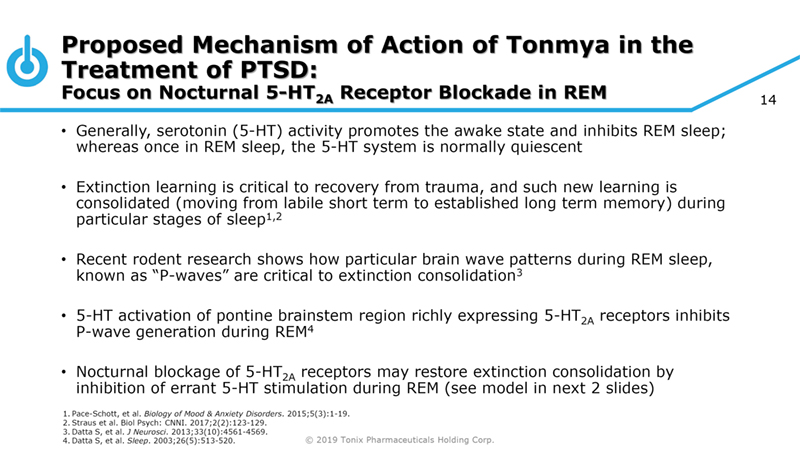
Proposed Mechanism of Action of Tonmya in the Treatment of PTSD: Focus on Nocturnal HT2A Receptor Blockade in REM 14 • Generally, serotonin (5-HT) activity promotes the awake state and inhibits REM sleep; whereas once in REM sleep, the 5-HT system is normally quiescent • Extinction learning is critical to recovery from trauma, and such new learning is consolidated (moving from labile short term to established long term memory) during particular stages of sleep1,2 • Recent rodent research shows how particular brain wave patterns during REM sleep, known as “P-waves” are critical to extinction consolidation3 • 5-HT activation of pontine brainstem region richly expressing 5-HT2A receptors inhibits P-wave generation during REM4 • Nocturnal blockage of 5-HT2A receptors may restore extinction consolidation by inhibition of errant 5-HT stimulation during REM (see model in next 2 slides) 1. Pace-Schott, et al. Biology of Mood & Anxiety Disorders. 2015;5(3):1-19. 2. Straus et al. Biol Psych: CNNI. 2017;2(2):123-129. 3. Datta S, et al. J Neurosci. 2013;33(10):4561-4569. 4. Datta S, et al. Sleep. 2003;26(5):513-520. © 2019 Tonix Pharmaceuticals Holding Corp.
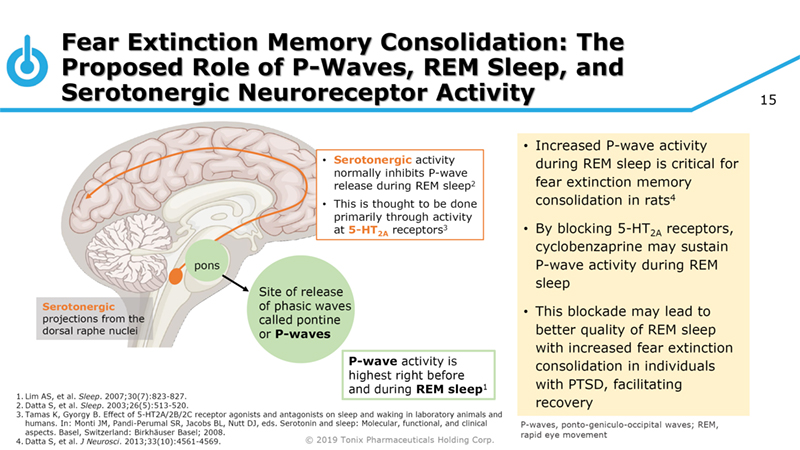
Fear Extinction Memory Consolidation: The Proposed Role of Waves, REM Sleep, and Serotonergic Neuroreceptor Activity 15 • Increased P-wave activity • Serotonergic activity during REM sleep is critical for normally inhibits P-wave release during REM sleep2 fear extinction memory • This is thought to be done consolidation in rats4 primarily through activity at 5-HT2A receptors3 • By blocking 5-HT2A receptors, cyclobenzaprine may sustain pons P-wave activity during REM sleep Site of release Serotonergic of phasic waves • This blockade may lead to projections from the called pontine dorsal raphe nuclei or P-waves better quality of REM sleep with increased fear extinction P-wave activity is consolidation in individuals highest right before and during REM sleep1 with PTSD, facilitating 1. Lim AS, et al. Sleep. 2007;30(7):823-827. recovery 2. Datta S, et al. Sleep. 2003;26(5):513-520. 3. Tamas K, Gyorgy B. Effect of 5-HT2A/2B/2C receptor agonists and antagonists on sleep and waking in laboratory animals and humans. In: Monti JM, Pandi-Perumal SR, Jacobs BL, Nutt DJ, eds. Serotonin and sleep: Molecular, functional, and clinical P-waves, ponto-geniculo-occipital waves; REM, aspects. Basel, Switzerland: Birkhäuser Basel; 2008. rapid eye movement 4. Datta S, et al. J Neurosci. 2013;33(10):4561-4569. © 2019 Tonix Pharmaceuticals Holding Corp.
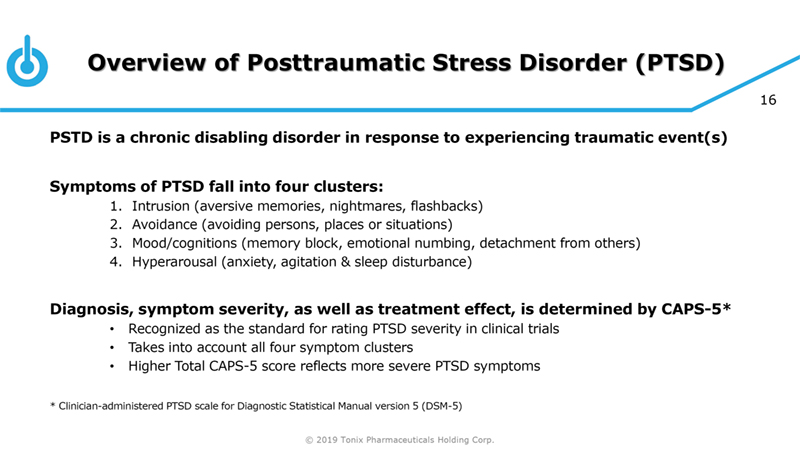
Overview of Posttraumatic Stress Disorder (PTSD) 16 PSTD is a chronic disabling disorder in response to experiencing traumatic event(s) Symptoms of PTSD fall into four clusters: 1. Intrusion (aversive memories, nightmares, flashbacks) 2. Avoidance (avoiding persons, places or situations) 3. Mood/cognitions (memory block, emotional numbing, detachment from others) 4. Hyperarousal (anxiety, agitation & sleep disturbance) Diagnosis, symptom severity, as well as treatment effect, is determined by CAPS-5* • Recognized as the standard for rating PTSD severity in clinical trials • Takes into account all four symptom clusters • Higher Total CAPS-5 score reflects more severe PTSD symptoms * Clinician-administered PTSD scale for Diagnostic Statistical Manual version 5 (DSM-5) © 2019 Tonix Pharmaceuticals Holding Corp.
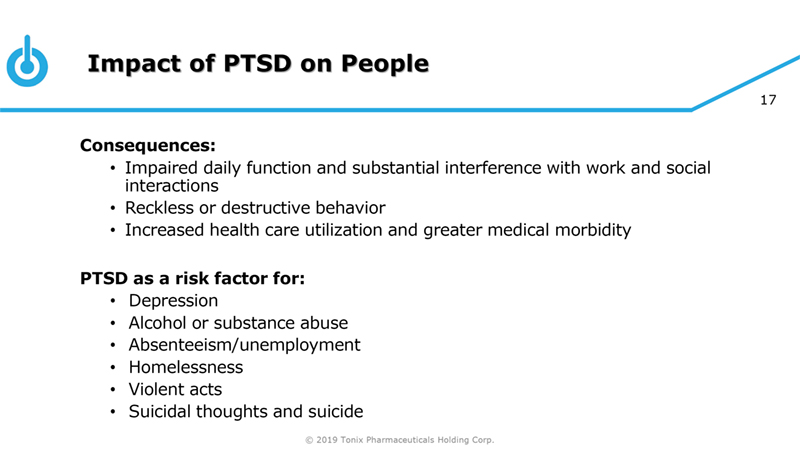
Impact of PTSD on People 17 Consequences: • Impaired daily function and substantial interference with work and social interactions • Reckless or destructive behavior • Increased health care utilization and greater medical morbidity PTSD as a risk factor for: • Depression • Alcohol or substance abuse • Absenteeism/unemployment • Homelessness • Violent acts • Suicidal thoughts and suicide © 2019 Tonix Pharmaceuticals Holding Corp.
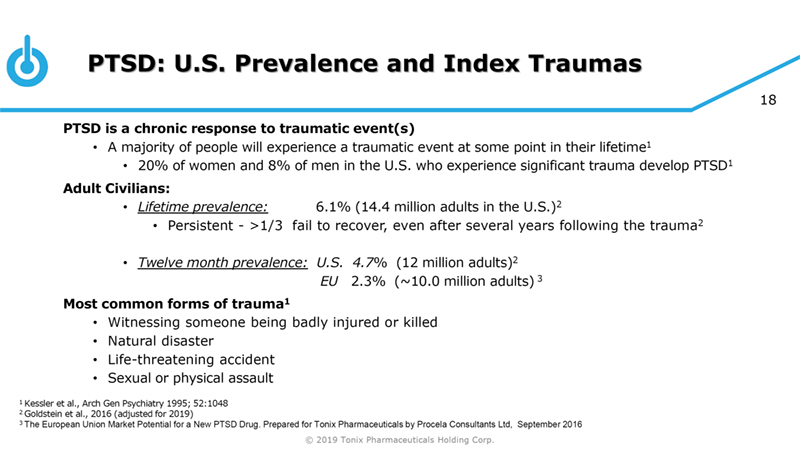
PTSD: U.S. Prevalence and Index Traumas 18 PTSD is a chronic response to traumatic event(s) • A majority of people will experience a traumatic event at some point in their lifetime1 • 20% of women and 8% of men in the U.S. who experience significant trauma develop PTSD1 Adult Civilians: • Lifetime prevalence: 6.1% (14.4 million adults in the U.S.)2 • Persistent - >1/3 fail to recover, even after several years following the trauma2 • Twelve month prevalence: U.S. 4.7% (12 million adults)2 EU 2.3% (~10.0 million adults) 3 Most common forms of trauma1 • Witnessing someone being badly injured or killed • Natural disaster • Life-threatening accident • Sexual or physical assault 1 Kessler et al., Arch Gen Psychiatry 1995; 52:1048 2 Goldstein et al., 2016 (adjusted for 2019) 3 The European Union Market Potential for a New PTSD Drug. Prepared for Tonix Pharmaceuticals by Procela Consultants Ltd, September 2016 © 2019 Tonix Pharmaceuticals Holding Corp.
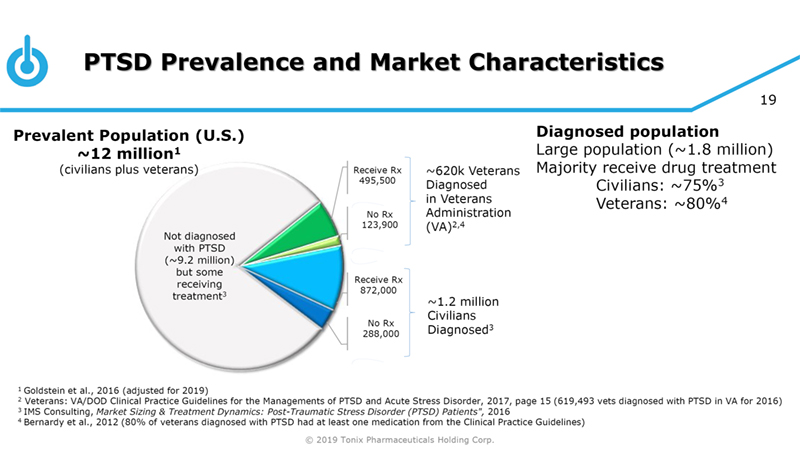
PTSD Prevalence and Market Characteristics 19 Prevalent Population (U.S.) Diagnosed population ~12 million1 Large population (~1.8 million) (civilians plus veterans) Receive Rx ~620k Veterans Majority receive drug treatment 495,500 Diagnosed Civilians: ~75%3 in Veterans Veterans: ~80%4 No Rx Administration 123,900 (VA)2,4 Not diagnosed with PTSD (~9.2 million) but some receiving Receive Rx 872,000 treatment3 ~1.2 million Civilians No Rx Diagnosed3 288,000 1 Goldstein et al., 2016 (adjusted for 2019) 2 Veterans: VA/DOD Clinical Practice Guidelines for the Managements of PTSD and Acute Stress Disorder, 2017, page 15 (619,493 vets diagnosed with PTSD in VA for 2016) 3 IMS Consulting, Market Sizing & Treatment Dynamics: Post-Traumatic Stress Disorder (PTSD) Patients”, 2016 4 Bernardy et al., 2012 (80% of veterans diagnosed with PTSD had at least one medication from the Clinical Practice Guidelines) © 2019 Tonix Pharmaceuticals Holding Corp.
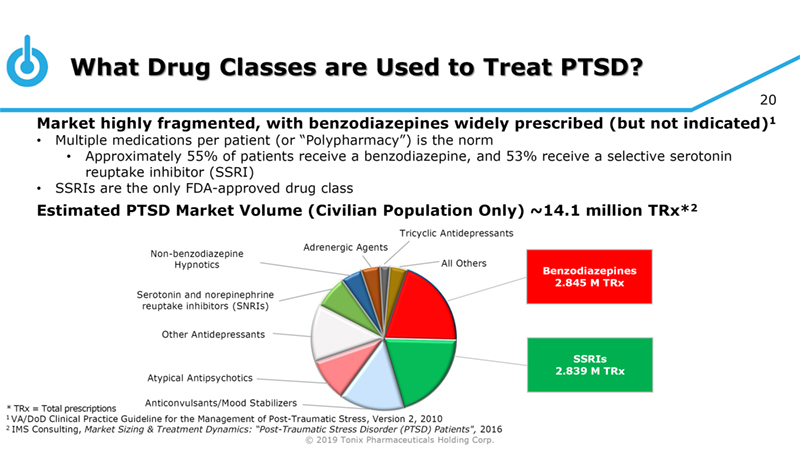
What Drug Classes are Used to Treat PTSD? 20 Market highly fragmented, with benzodiazepines widely prescribed (but not indicated)1 • Multiple medications per patient (or “Polypharmacy”) is the norm • Approximately 55% of patients receive a benzodiazepine, and 53% receive a selective serotonin reuptake inhibitor (SSRI) • SSRIs are the only FDA-approved drug class Estimated PTSD Market Volume (Civilian Population Only) ~14.1 million TRx*2 Tricyclic Antidepressants Adrenergic Agents Non-benzodiazepine Hypnotics All Others Benzodiazepines 2.845 M TRx Serotonin and norepinephrine reuptake inhibitors (SNRIs) Other Antidepressants SSRIs 2.839 M TRx Atypical Antipsychotics Anticonvulsants/Mood Stabilizers * TRx = Total prescriptions 1 VA/DoD Clinical Practice Guideline for the Management of Post-Traumatic Stress, Version 2, 2010 2 IMS Consulting, Market Sizing & Treatment Dynamics: “Post-Traumatic Stress Disorder (PTSD) Patients”, 2016 © 2019 Tonix Pharmaceuticals Holding Corp.
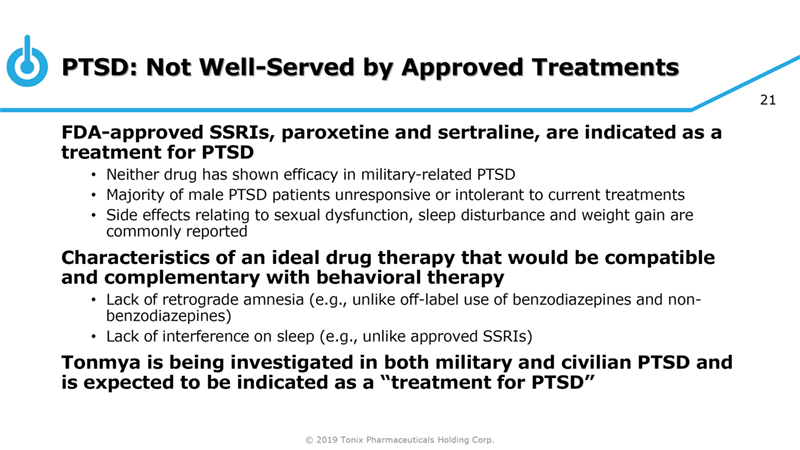
PTSD: Not Well Served by Approved Treatments 21 FDA-approved SSRIs, paroxetine and sertraline, are indicated as a treatment
for PTSD • Neither drug has shown efficacy in military-related PTSD • Majority of male PTSD patients unresponsive
or intolerant to current treatments • Side effects relating to sexual dysfunction, sleep disturbance and weight gain are
commonly reported Characteristics of an ideal drug therapy that would be compatible and complementary with behavioral therapy
• Lack of retrograde amnesia (e.g., unlike off-label use of benzodiazepines and non-benzodiazepines) • Lack of interference
on sleep (e.g., unlike approved SSRIs) Tonmya is being investigated in both military and civilian PTSD and is expected to be
indicated as a “treatment for PTSD” © 2019 Tonix Pharmaceuticals Holding Corp.
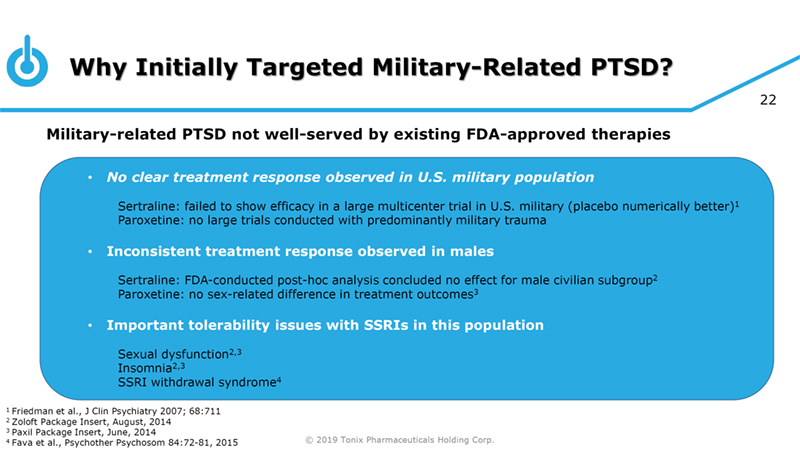
Why Initially Targeted Military Related PTSD? 22 Military-related PTSD not well-served by existing FDA-approved therapies • No clear treatment response observed in U.S. military population Sertraline: failed to show efficacy in a large multicenter trial in U.S. military (placebo numerically better)1 Paroxetine: no large trials conducted with predominantly military trauma • Inconsistent treatment response observed in males Sertraline: FDA-conducted post-hoc analysis concluded no effect for male civilian subgroup2 Paroxetine: no sex-related difference in treatment outcomes3 • Important tolerability issues with SSRIs in this population Sexual dysfunction2,3 Insomnia2,3 SSRI withdrawal syndrome4 1 Friedman et al., J Clin Psychiatry 2007; 68:711 2 Zoloft Package Insert, August, 2014 3 Paxil Package Insert, June, 2014 4 Fava et al., Psychother Psychosom 84:72-81, 2015 © 2019 Tonix Pharmaceuticals Holding Corp.
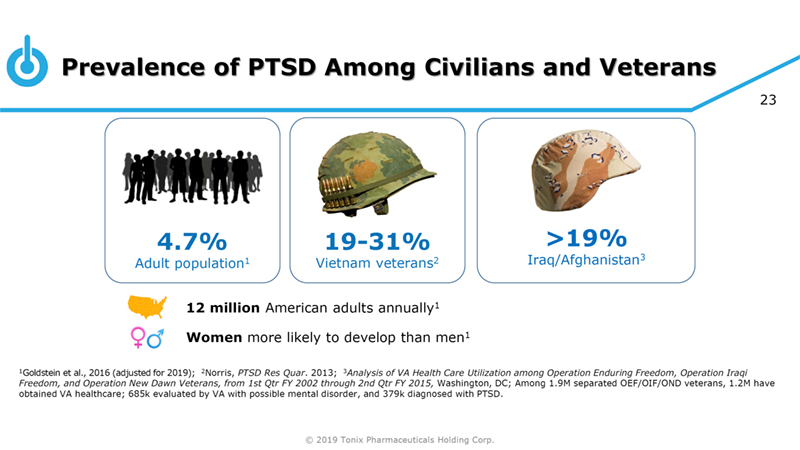
Prevalence of PTSD Among Civilians and Veterans 23 4.7% 19-31% >19% Adult population1 Vietnam veterans2 Iraq/Afghanistan3 12 million American adults annually1 Women more likely to develop than men1 1Goldstein et al., 2016 (adjusted for 2019); 2Norris, PTSD Res Quar. 2013; 3Analysis of VA Health Care Utilization among Operation Enduring Freedom, Operation Iraqi Freedom, and Operation New Dawn Veterans, from 1st Qtr FY 2002 through 2nd Qtr FY 2015, Washington, DC; Among 1.9M separated OEF/OIF/OND veterans, 1.2M have obtained VA healthcare; 685k evaluated by VA with possible mental disorder, and 379k diagnosed with PTSD. © 2019 Tonix Pharmaceuticals Holding Corp.
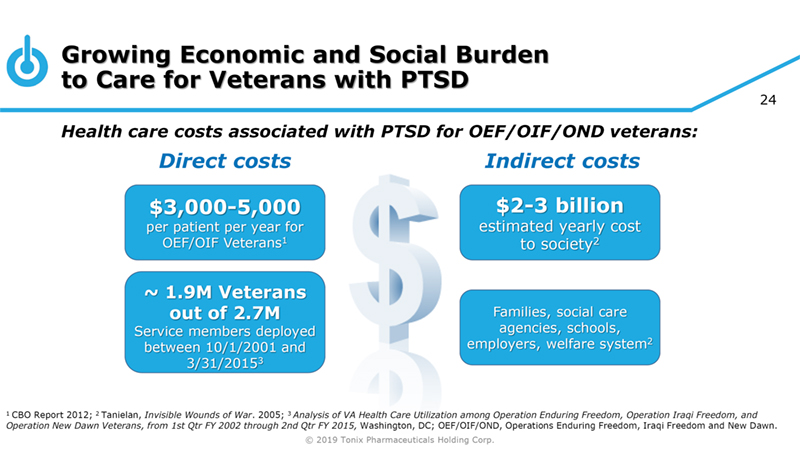
Growing Economic and Social Burden to Care for Veterans with PTSD 24 Health care costs associated with PTSD for OEF/OIF/OND veterans: Direct costs Indirect costs $3,000 5,000 $2 3 billion per patient per year for estimated yearly cost OEF/OIF Veterans1 to society2 ~ 1.9M Veterans out of 2.7M Families, social care Service members deployed agencies, schools, between 10/1/2001 and employers, welfare system2 3/31/20153 1 CBO Report 2012; 2 Tanielan, Invisible Wounds of War. 2005; 3 Analysis of VA Health Care Utilization among Operation Enduring Freedom, Operation Iraqi Freedom, and Operation New Dawn Veterans, from 1st Qtr FY 2002 through 2nd Qtr FY 2015, Washington, DC; OEF/OIF/OND, Operations Enduring Freedom, Iraqi Freedom and New Dawn. © 2019 Tonix Pharmaceuticals Holding Corp.
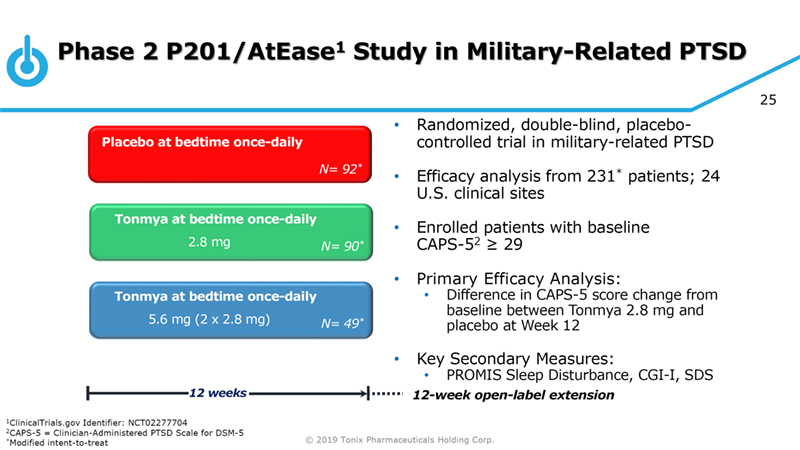
Phase 2 P201/AtEase Study in Military Related PTSD 25 • Randomized, double-blind, placebo-Placebo at bedtime once-daily controlled trial in military-related PTSD N= 92* • Efficacy analysis from 231* patients; 24 U.S. clinical sites Tonmya at bedtime once-daily • Enrolled patients with baseline 2.8 mg N= 90* CAPS-52 29 • Primary Efficacy Analysis: Tonmya at bedtime once-daily • Difference in CAPS-5 score change from baseline between Tonmya 2.8 mg and 5.6 mg (2 x 2.8 mg) N= 49* placebo at Week 12 • Key Secondary Measures: • PROMIS Sleep Disturbance, CGI-I, SDS 12 weeks 12-week open-label extension 1ClinicalTrials.gov Identifier: NCT02277704 2CAPS-5 = Clinician-Administered PTSD Scale for DSM-5 *Modified intent-to-treat © 2019 Tonix Pharmaceuticals Holding Corp.
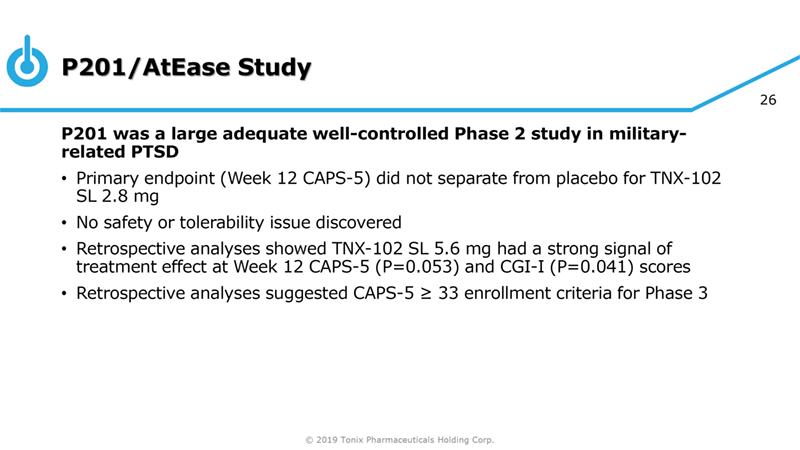
P201/AtEase Study 26 P201 was a large adequate well-controlled Phase 2 study in military-related PTSD • Primary endpoint (Week 12 CAPS-5) did not separate from placebo for TNX-102 SL 2.8 mg • No safety or tolerability issue discovered • Retrospective analyses showed TNX-102 SL 5.6 mg had a strong signal of treatment effect at Week 12 CAPS-5 (P=0.053) and CGI-I (P=0.041) scores • Retrospective analyses suggested CAPS-5 33 enrollment criteria for Phase 3 © 2019 Tonix Pharmaceuticals Holding Corp.
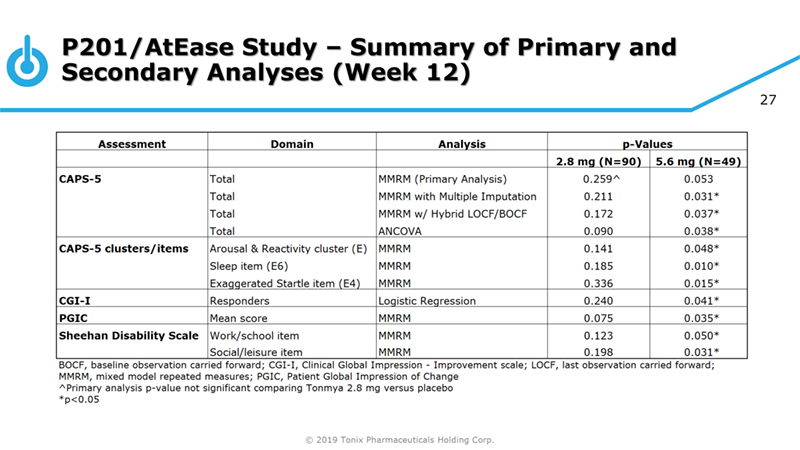
P201/AtEase Study – Summary of Primary and Secondary Analyses (Week 12) 27 © 2019 Tonix Pharmaceuticals Holding Corp.
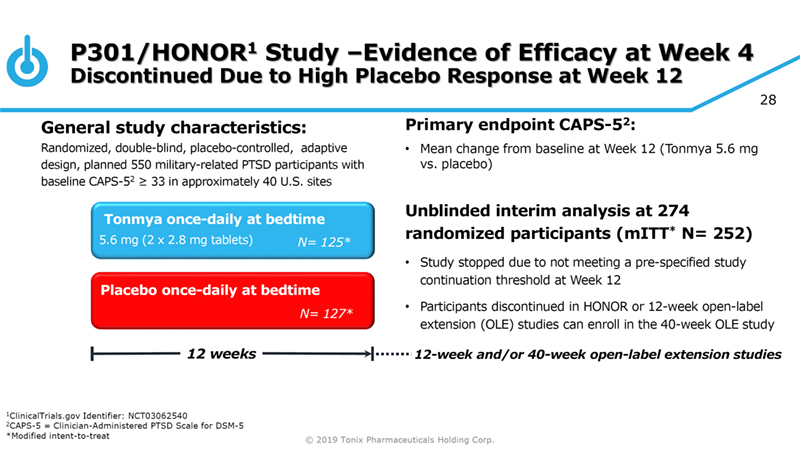
P301/HONOR Study Evidence of Efficacy at Week 4 Discontinued Due to High Placebo Response at Week 12 28 General study characteristics: Primary endpoint CAPS-52: Randomized, double-blind, placebo-controlled, adaptive • Mean change from baseline at Week 12 (Tonmya 5.6 mg design, planned 550 military-related PTSD participants with vs. placebo) baseline CAPS-52 33 in approximately 40U.S. sites Unblinded interim analysis at 274 Tonmya once-daily at bedtime 5.6 mg (2 x 2.8 mg tablets) randomized participants (mITT* N= 252) N= 125* • Study stopped due to not meeting a pre-specified study continuation threshold at Week 12 Placebo once-daily at bedtime • Participants discontinued in HONOR or 12-week open-label N= 127* extension (OLE) studies can enroll in the 40-week OLE study 12 weeks 12-week and/or 40-week open-label extension studies 1ClinicalTrials.gov Identifier: NCT03062540 2CAPS-5 = Clinician-Administered PTSD Scale for DSM-5 *Modified intent-to-treat © 2019 Tonix Pharmaceuticals Holding Corp.
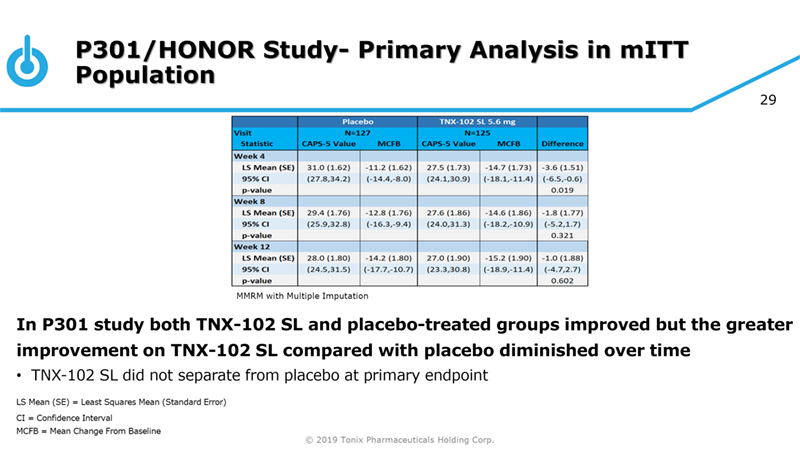
P301/HONOR Study Primary Analysis in mITT Population 29 MMRM with Multiple Imputation In P301 study both TNX-102 SL and placebo-treated groups improved but the greater improvement on TNX-102 SL compared with placebo diminished over time • TNX-102 SL did not separate from placebo at primary endpoint LS Mean (SE) = Least Squares Mean (Standard Error) CI = Confidence Interval MCFB = Mean Change From Baseline © 2019 Tonix Pharmaceuticals Holding Corp.
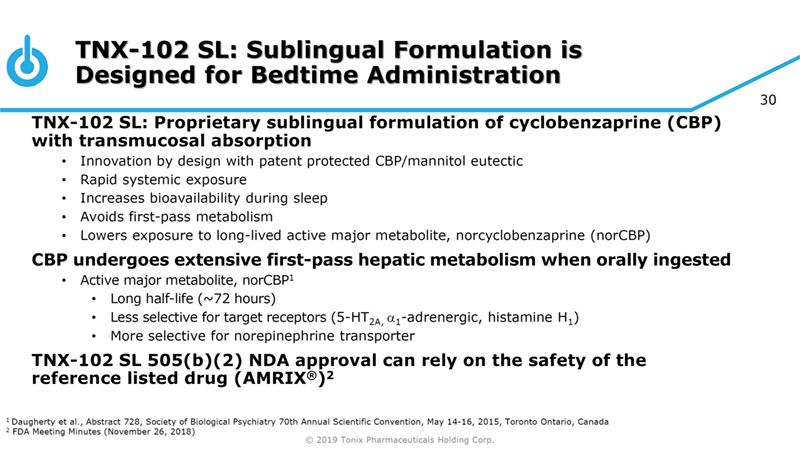
TNX 102 SL: Sublingual Formulation is Designed for Bedtime Administration 30 TNX-102 SL: Proprietary sublingual formulation of cyclobenzaprine (CBP) with transmucosal absorption • Innovation by design with patent protected CBP/mannitol eutectic • Rapid systemic exposure • Increases bioavailability during sleep • Avoids first-pass metabolism • Lowers exposure to long-lived active major metabolite, norcyclobenzaprine (norCBP) CBP undergoes extensive first-pass hepatic metabolism when orally ingested • Active major metabolite, norCBP1 • Long half-life (~72 hours) • Less selective for target receptors (5-HT2A, 1-adrenergic, histamine H1) • More selective for norepinephrine transporter TNX-102 SL 505(b)(2) NDA approval can rely on the safety of the reference listed drug (AMRIX®)2 1 Daugherty et al., Abstract 728, Society of Biological Psychiatry 70th Annual Scientific Convention, May 14-16, 2015, Toronto Ontario, Canada 2 FDA Meeting Minutes (November 26, 2018) © 2019 Tonix Pharmaceuticals Holding Corp.
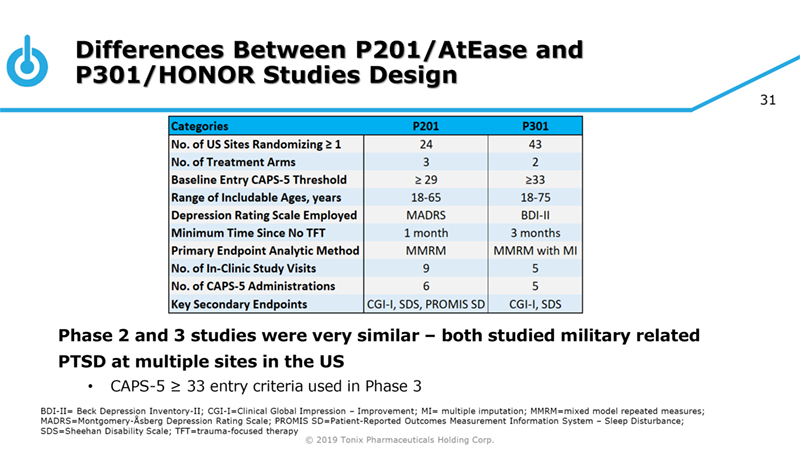
Differences Between P201/AtEase and P301/HONOR Studies Design 31 Phase 2 and 3 studies were very similar – both studied military related PTSD at multiple sites in the US • CAPS-5 33 entry criteria used in Phase 3 BDI-II= Beck Depression Inventory-II; CGI-I=Clinical Global Impression – Improvement; MI= multiple imputation; MMRM=mixed model repeated measures; MADRS=Montgomery-Åsberg Depression Rating Scale; PROMIS SD=Patient-Reported Outcomes Measurement Information System – Sleep Disturbance; SDS=Sheehan Disability Scale; TFT=trauma-focused therapy © 2019 Tonix Pharmaceuticals Holding Corp.
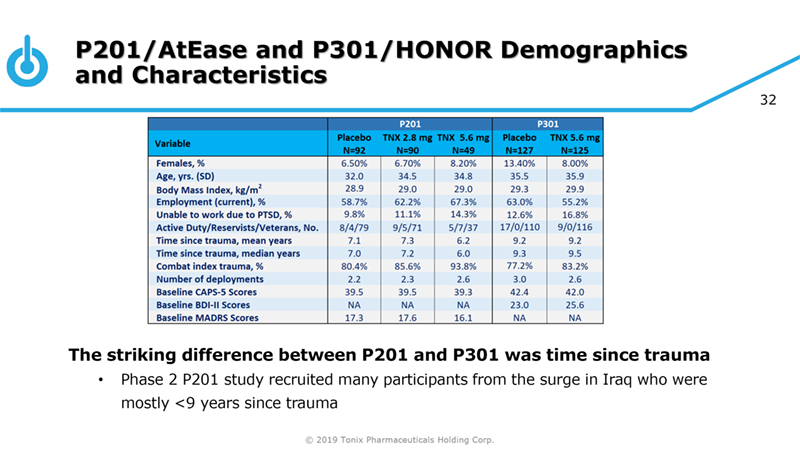
P201/AtEase and P301/HONOR Demographics and Characteristics 32 The striking difference between P201 and P301 was time since trauma • Phase 2 P201 study recruited many participants from the surge in Iraq who were mostly <9 years since trauma © 2019 Tonix Pharmaceuticals Holding Corp.
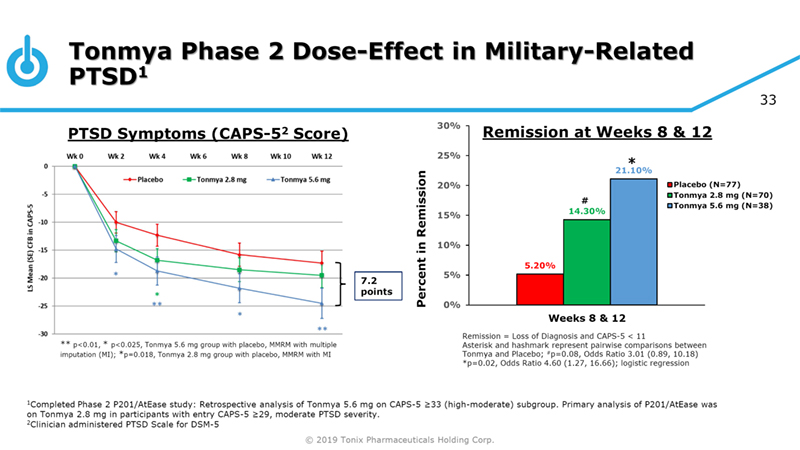
Tonmya Phase 2 Dose Effect in Military Related PTSD1 33 PTSD Symptoms (CAPS-52 Score) 30% Remission at Weeks 8 & 12 25% * 21.10% 20% Placebo (N=77) Tonmya 2.8 mg (N=70) # Tonmya 5.6 mg (N=38) 15% 14.30% 10% 5.20% 5% 7.2 points Percent in Remission 0% Weeks 8 & 12 Remission = Loss of Diagnosis and CAPS-5 < 11 ** p<0.01, * p<0.025, Tonmya 5.6 mg group with placebo, MMRM with multiple Asterisk and hashmark represent pairwise comparisons between imputation (MI); *p=0.018, Tonmya 2.8 mg group with placebo, MMRM with MI Tonmya and Placebo; #p=0.08, Odds Ratio 3.01 (0.89, 10.18) *p=0.02, Odds Ratio 4.60 (1.27, 16.66); logistic regression 1Completed Phase 2 P201/AtEase study: Retrospective analysis of Tonmya 5.6 mg on CAPS-5 33 (high-moderate) subgroup. Primary analysis of P201/AtEase was on Tonmya 2.8 mg in participants with entry CAPS-5 29, moderate PTSD severity. 2Clinician administered PTSD Scale for DSM-5 © 2019 Tonix Pharmaceuticals Holding Corp.
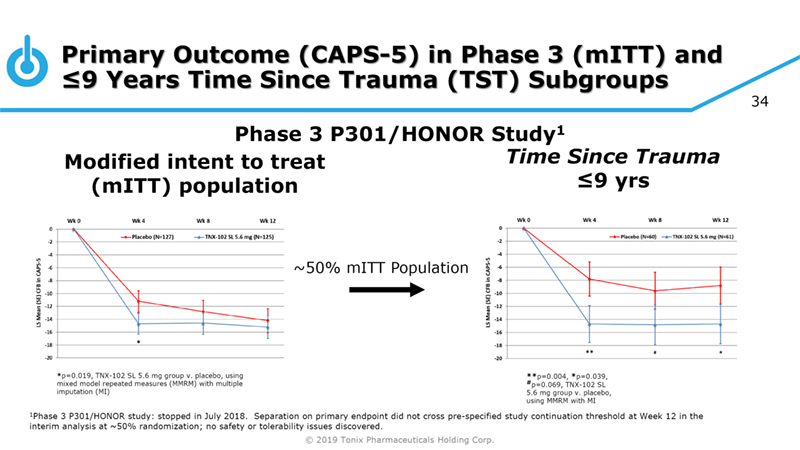
Primary Outcome (CAPS 5) in Phase 3 mITT) and 9 Years Time Since Trauma (TST) Subgroups 34 Phase 3 P301/HONOR Study1 Modified intent to treat Time Since Trauma (mITT) population 9 yrs ~50% mITT Population *p=0.019, TNX-102 SL 5.6 mg group v. placebo, using **p=0.004, *p=0.039, mixed model repeated measures (MMRM) with multiple #p=0.069, TNX-102 SL imputation (MI) 5.6 mg group v. placebo, using MMRM with MI 1Phase 3 P301/HONOR study: stopped in July 2018. Separation on primary endpoint did not cross pre-specified study continuation threshold at Week 12 in the interim analysis at ~50% randomization; no safety or tolerability issues discovered. © 2019 Tonix Pharmaceuticals Holding Corp.
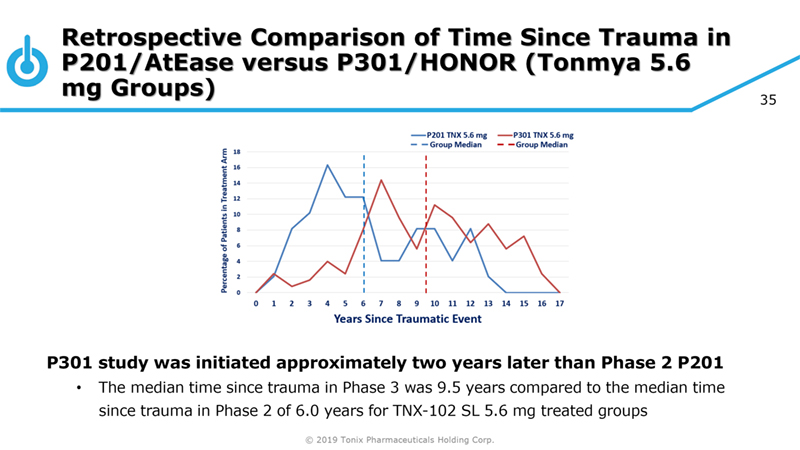
Retrospective Comparison of Time Since Trauma in P201/AtEase versus P301/HONOR (Tonmya 5.6 mg Groups) 35 P301 study was initiated approximately two years later than Phase 2 P201 • The median time since trauma in Phase 3 was 9.5 years compared to the median time since trauma in Phase 2 of 6.0 years for TNX-102 SL 5.6 mg treated groups © 2019 Tonix Pharmaceuticals Holding Corp.
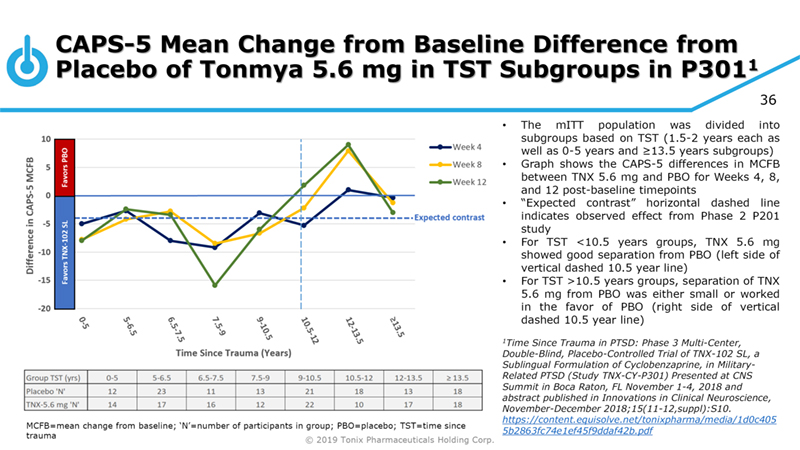
CAPS 5 Mean Change from Baseline Difference from Placebo of Tonmya 5.6 mg in TST Subgroups in P3011 36 • The mITT population was divided into subgroups based on TST (1.5-2 years each as well as 0-5 years and 13.5 years subgroups) • Graph shows the CAPS-5 differences in MCFB between TNX 5.6 mg and PBO for Weeks 4, 8, and 12 post-baseline timepoints • “Expected contrast” horizontal dashed line indicates observed effect from Phase 2 P201 study • For TST <10.5 years groups, TNX 5.6 mg showed good separation from PBO (left side of vertical dashed 10.5 year line) • For TST >10.5 years groups, separation of TNX 5.6 mg from PBO was either small or worked in the favor of PBO (right side of vertical dashed 10.5 year line) 1Time Since Trauma in PTSD: Phase 3 Multi-Center, Double-Blind, Placebo-Controlled Trial of TNX-102 SL, a Sublingual Formulation of Cyclobenzaprine, in Military-Related PTSD (Study TNX-CY-P301) Presented at CNS Summit in Boca Raton, FL November 1-4, 2018 and abstract published in Innovations in Clinical Neuroscience, November-December 2018;15(11-12,suppl):S10. https://content.equisolve.net/tonixpharma/media/1d0c405 MCFB=mean change from baseline; ‘N’=number of participants in group; PBO=placebo; TST=time since 5b2863fc74e1ef45f9ddaf42b.pdf trauma © 2019 Tonix Pharmaceuticals Holding Corp.
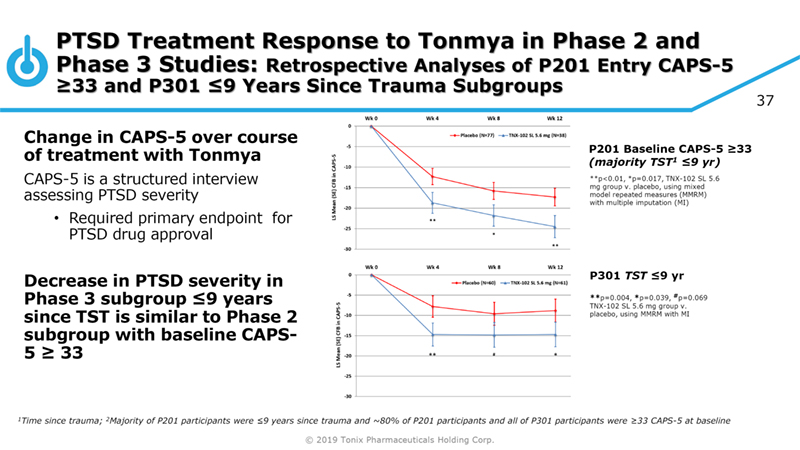
PTSD Treatment Response to Tonmya in Phase 2 and Phase 3 Studies: Retrospective Analyses of P201 Entry CAPS 5 33 and P301 9 Years Since Trauma Subgroups 37 Change in CAPS-5 over course of treatment with Tonmya P201 Baseline CAPS-5 33 (majority TST1 9 yr) CAPS-5 is a structured interview **p<0.01, *p=0.017, TNX-102 SL 5.6 mg group v. placebo, using mixed assessing PTSD severity model repeated measures (MMRM) with multiple imputation (MI) • Required primary endpoint for PTSD drug approval Decrease in PTSD severity in P301 TST 9 yr Phase 3 subgroup 9 years **p=0.004, *p=0.039, #p=0.069 TNX-102 SL 5.6 mg group v. since TST is similar to Phase 2 placebo, using MMRM with MI subgroup with baseline CAPS- 5 33 1Time since trauma; 2Majority of P201 participants were 9 years since trauma and ~80% of P201 participants and all of P301 participants were 33 CAPS-5 at baseline © 2019 Tonix Pharmaceuticals Holding Corp.
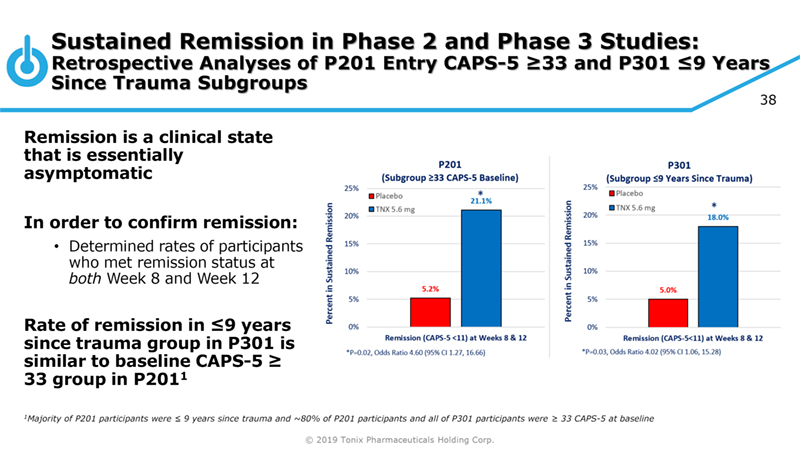
Sustained Remission in Phase 2 and Phase 3 Studies: Retrospective Analyses of P201 Entry CAPS 5 33 and P301 9 Years Since Trauma Subgroups 38 Remission is a clinical state that is essentially asymptomatic In order to confirm remission: • Determined rates of participants who met remission status at both Week 8 and Week 12 Rate of remission in 9 years since trauma group in P301 is similar to baseline CAPS-5 33 group in P2011 1Majority of P201 participants were 9 years since trauma and ~80% of P201 participants and all of P301 participants were 33 CAPS-5 at baseline © 2019 Tonix Pharmaceuticals Holding Corp.
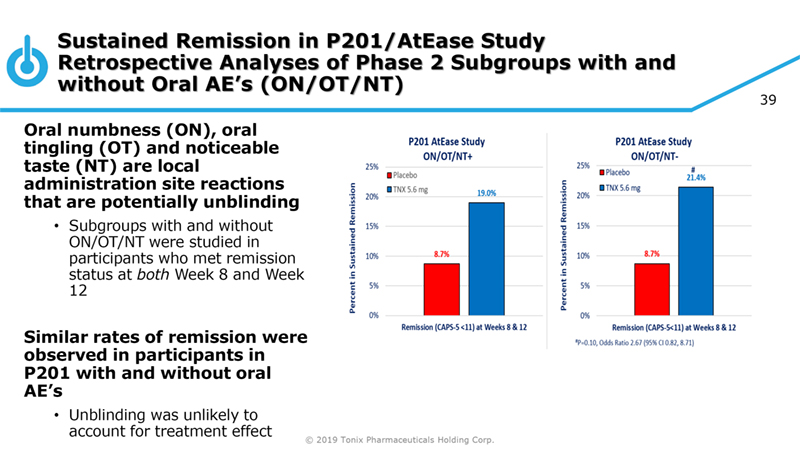
Sustained Remission in P201/AtEase Study Retrospective Analyses of Phase 2 Subgroups with and without Oral AE’s (ON/OT/NT) 39 Oral numbness (ON), oral tingling (OT) and noticeable taste (NT) are local administration site reactions that are potentially unblinding • Subgroups with and without ON/OT/NT were studied in participants who met remission status at both Week 8 and Week 12 Similar rates of remission were observed in participants in P201 with and without oral AE’s • Unblinding was unlikely to account for treatment effect © 2019 Tonix Pharmaceuticals Holding Corp.
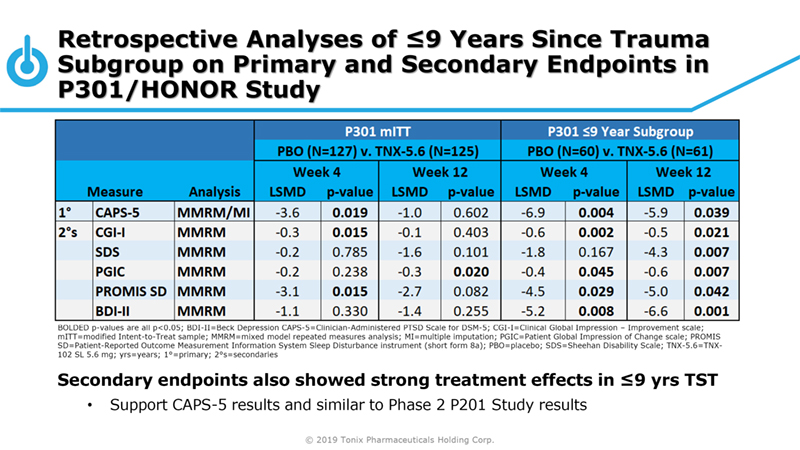
Retrospective Analyses of 9 Years Since Trauma Subgroup on Primary and Secondary Endpoints in P301/HONOR Study BOLDED p-values are all p<0.05; BDI-II=Beck Depression CAPS-5=Clinician-Administered PTSD Scale for DSM-5; CGI-I=Clinical Global Impression – Improvement scale; mITT=modified Intent-to-Treat sample; MMRM=mixed model repeated measures analysis; MI=multiple imputation; PGIC=Patient Global Impression of Change scale; PROMIS SD=Patient-Reported Outcome Measurement Information System Sleep Disturbance instrument (short form 8a); PBO=placebo; SDS=Sheehan Disability Scale; TNX-5.6=TNX-102 SL 5.6 mg; yrs=years; 1°=primary; 2°s=secondaries Secondary endpoints also showed strong treatment effects in 9 yrs TST • Support CAPS-5 results and similar to Phase 2 P201 Study results © 2019 Tonix Pharmaceuticals Holding Corp.
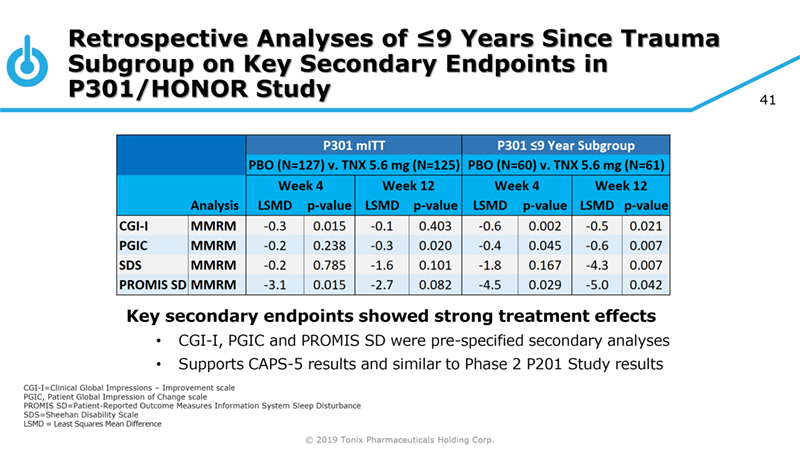
Retrospective Analyses of 9 Years Since Trauma Subgroup on Key Secondary Endpoints in P301/HONOR Study 41 Key secondary endpoints showed strong treatment effects • CGI-I, PGIC and PROMIS SD were pre-specified secondary analyses • Supports CAPS-5 results and similar to Phase 2 P201 Study results CGI-I=Clinical Global Impressions – Improvement scale PGIC, Patient Global Impression of Change scale PROMIS SD=Patient-Reported Outcome Measures Information System Sleep Disturbance SDS=Sheehan Disability Scale LSMD = Least Squares Mean Difference © 2019 Tonix Pharmaceuticals Holding Corp.
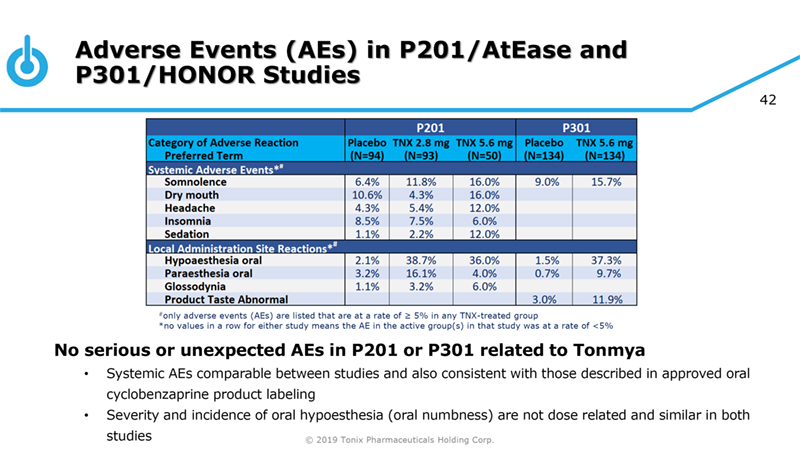
Adverse Events (AEs) in P201/AtEase and P301/HONOR Studies 42 #only adverse events (AEs) are listed that are at a rate of 5% in any TNX-treated group *no values in a row for either study means the AE in the active group(s) in that study was at a rate of <5% No serious or unexpected AEs in P201 or P301 related to Tonmya • Systemic AEs comparable between studies and also consistent with those described in approved oral cyclobenzaprine product labeling • Severity and incidence of oral hypoesthesia (oral numbness) are not dose related and similar in both studies © 2019 Tonix Pharmaceuticals Holding Corp.
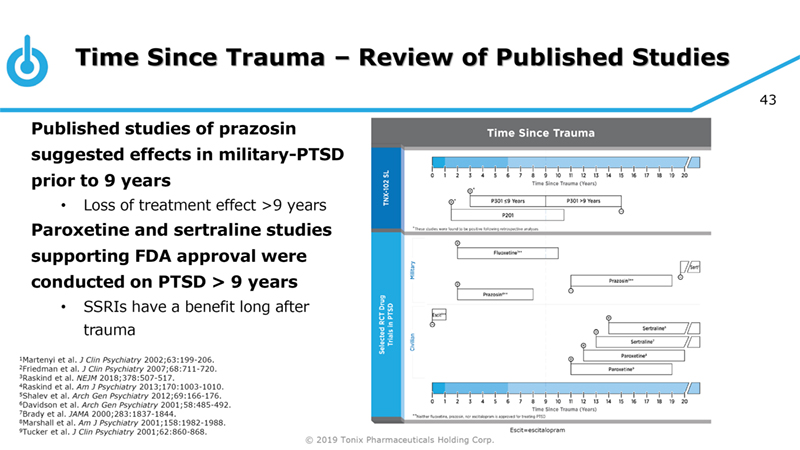
Time Since Trauma – Review of Published Studies 43 Published studies of prazosin suggested effects in military-PTSD prior to 9 years • Loss of treatment effect >9 years Paroxetine and sertraline studies supporting FDA approval were conducted on PTSD > 9 years • SSRIs have a benefit long after trauma 1Martenyi et al. J Clin Psychiatry 2002;63:199-206. 2Friedman et al. J Clin Psychiatry 2007;68:711-720. 3Raskind et al. NEJM 2018;378:507-517. 4Raskind et al. Am J Psychiatry 2013;170:1003-1010. 5Shalev et al. Arch Gen Psychiatry 2012;69:166-176. 6Davidson et al. Arch Gen Psychiatry 2001;58:485-492. 7Brady et al. JAMA 2000;283:1837-1844. 8Marshall et al. Am J Psychiatry 2001;158:1982-1988. 9Tucker et al. J Clin Psychiatry 2001;62:860-868. Escit=escitalopram © 2019 Tonix Pharmaceuticals Holding Corp.
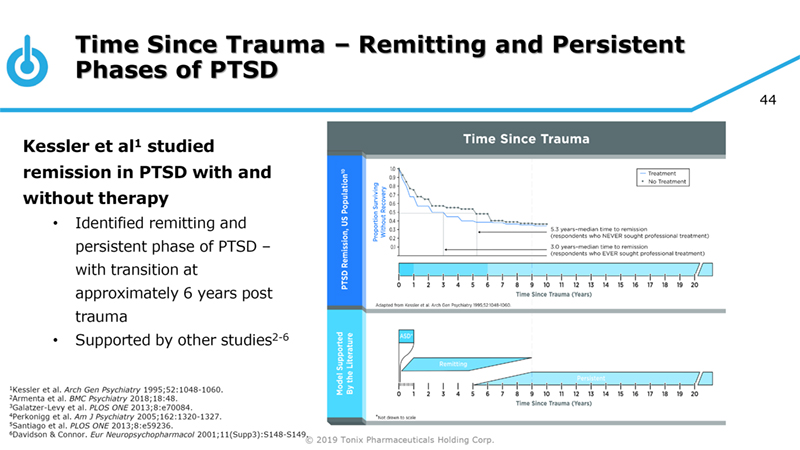
Time Since Trauma – Remitting and Persistent Phases of PTSD 44 Kessler et al1 studied remission in PTSD with and without therapy • Identified remitting and persistent phase of PTSD –with transition at approximately 6 years post trauma • Supported by other studies2-6 1Kessler et al. Arch Gen Psychiatry 1995;52:1048-1060. 2Armenta et al. BMC Psychiatry 2018;18:48. 3Galatzer-Levy et al. PLOS ONE 2013;8:e70084. 4Perkonigg et al. Am J Psychiatry 2005;162:1320-1327. 5Santiago et al. PLOS ONE 2013;8:e59236. 6Davidson & Connor. Eur Neuropsychopharmacol 2001;11(Supp3):S148-S149. © 2019 Tonix Pharmaceuticals Holding Corp.
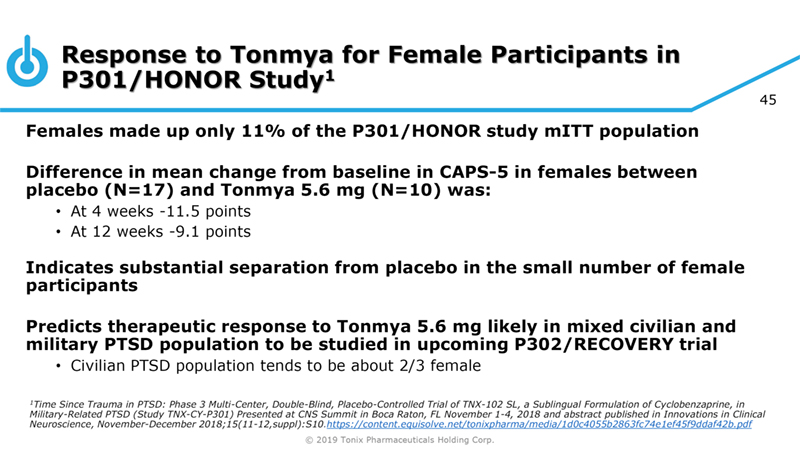
Response to Tonmya for Female Participants in P301/HONOR Study1 45 Females made up only 11% of the P301/HONOR study mITT population Difference in mean change from baseline in CAPS-5 in females between placebo (N=17) and Tonmya 5.6 mg (N=10) was: • At 4 weeks -11.5 points • At 12 weeks -9.1 points Indicates substantial separation from placebo in the small number of female participants Predicts therapeutic response to Tonmya 5.6 mg likely in mixed civilian and military PTSD population to be studied in upcoming P302/RECOVERY trial • Civilian PTSD population tends to be about 2/3 female 1Time Since Trauma in PTSD: Phase 3 Multi-Center, Double-Blind, Placebo-Controlled Trial of TNX-102 SL, a Sublingual Formulation of Cyclobenzaprine, in Military-Related PTSD (Study TNX-CY-P301) Presented at CNS Summit in Boca Raton, FL November 1-4, 2018 and abstract published in Innovations in Clinical Neuroscience, November-December 2018;15(11-12,suppl):S10.https://content.equisolve.net/tonixpharma/media/1d0c4055b2863fc74e1ef45f9ddaf42b.pdf © 2019 Tonix Pharmaceuticals Holding Corp.
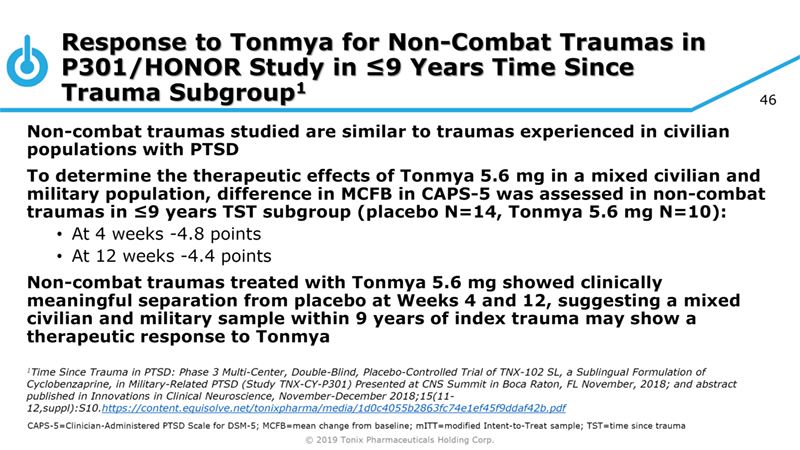
Response to Tonmya for Non Combat Traumas in P301/HONOR Study in 9 Years Time Since Trauma Subgroup1 46 Non-combat traumas studied are similar to traumas experienced in civilian populations with PTSD To determine the therapeutic effects of Tonmya 5.6 mg in a mixed civilian and military population, difference in MCFB in CAPS-5 was assessed in non-combat traumas in 9 years TST subgroup (placebo N=14, Tonmya 5.6 mg N=10): • At 4 weeks -4.8 points • At 12 weeks -4.4 points Non-combat traumas treated with Tonmya 5.6 mg showed clinically meaningful separation from placebo at Weeks 4 and 12, suggesting a mixed civilian and military sample within 9 years of index trauma may show a therapeutic response to Tonmya 1Time Since Trauma in PTSD: Phase 3 Multi-Center, Double-Blind, Placebo-Controlled Trial of TNX-102 SL, a Sublingual Formulation of Cyclobenzaprine, in Military-Related PTSD (Study TNX-CY-P301) Presented at CNS Summit in Boca Raton, FL November, 2018; and abstract published in Innovations in Clinical Neuroscience, November-December 2018;15(11-12,suppl):S10.https://content.equisolve.net/tonixpharma/media/1d0c4055b2863fc74e1ef45f9ddaf42b.pdf CAPS-5=Clinician-Administered PTSD Scale for DSM-5; MCFB=mean change from baseline; mITT=modified Intent-to-Treat sample; TST=time since trauma © 2019 Tonix Pharmaceuticals Holding Corp.
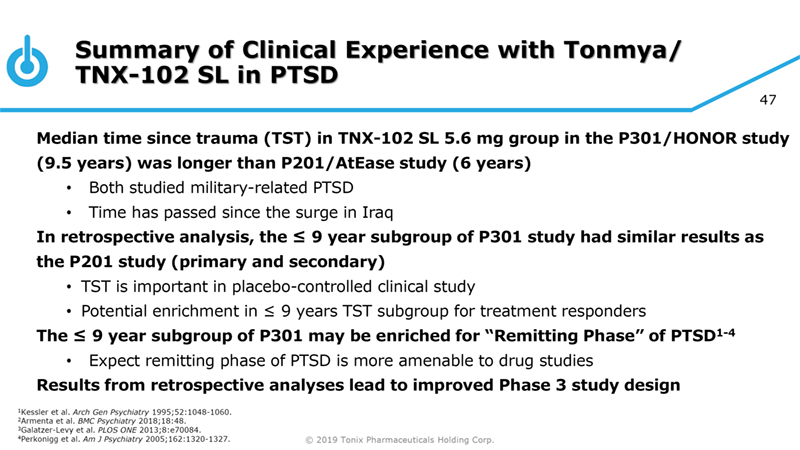
Summary of Clinical Experience with Tonmya/ TNX 102 SL in PTSD 47 Median time since trauma (TST) in TNX-102 SL 5.6 mg group in the P301/HONOR study (9.5 years) was longer than P201/AtEase study (6 years) • Both studied military-related PTSD • Time has passed since the surge in Iraq In retrospective analysis, the 9 year subgroup of P301 study had similar results as the P201 study (primary and secondary) • TST is important in placebo-controlled clinical study • Potential enrichment in 9 years TST subgroup for treatment responders The 9 year subgroup of P301 may be enriched for “Remitting Phase” of PTSD1-4 • Expect remitting phase of PTSD is more amenable to drug studies Results from retrospective analyses lead to improved Phase 3 study design 1Kessler et al. Arch Gen Psychiatry 1995;52:1048-1060. 2Armenta et al. BMC Psychiatry 2018;18:48. 3Galatzer-Levy et al. PLOS ONE 2013;8:e70084. 4Perkonigg et al. Am J Psychiatry 2005;162:1320-1327. © 2019 Tonix Pharmaceuticals Holding Corp.
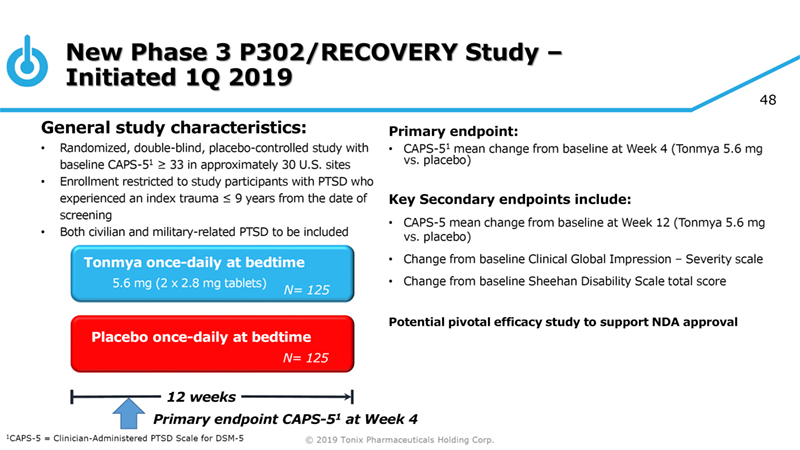
New Phase 3 P302/RECOVERY Study –Initiated 1Q 2019 48 General study characteristics: Primary endpoint: • Randomized, double-blind, placebo-controlled study with • CAPS-51 mean change from baseline at Week 4 (Tonmya 5.6 mg baseline CAPS-51 33 in approximately 30 U.S. sites vs. placebo) • Enrollment restricted to study participants with PTSD who experienced an index trauma 9 years from the date of Key Secondary endpoints include: screening • CAPS-5 mean change from baseline at Week 12 (Tonmya 5.6 mg • Both civilian and military-related PTSD to be included vs. placebo) Tonmya once-daily at bedtime • Change from baseline Clinical Global Impression – Severity scale 5.6 mg (2 x 2.8 mg tablets) • Change from baseline Sheehan Disability Scale total score N= 125 Potential pivotal efficacy study to support NDA approval Placebo once-daily at bedtime N= 125 12 weeks Primary endpoint CAPS-51 at Week 4 1CAPS-5 = Clinician-Administered PTSD Scale for DSM-5 © 2019 Tonix Pharmaceuticals Holding Corp.
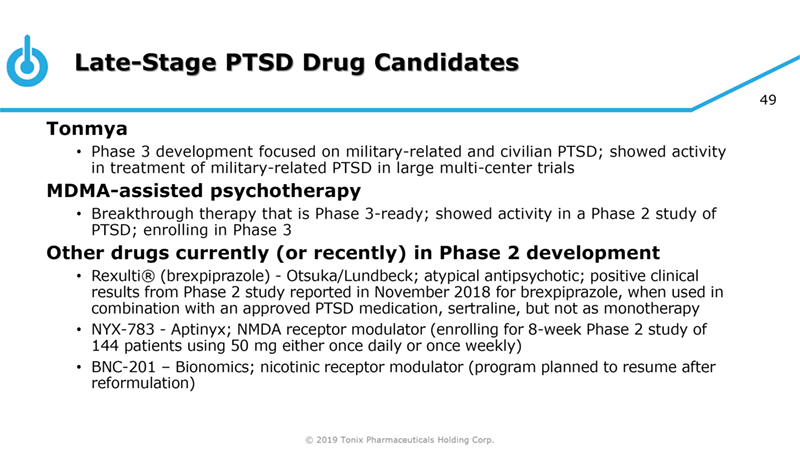
Late Stage PTSD Drug Candidates 49 Tonmya • Phase 3 development focused on military-related and civilian PTSD; showed activity in treatment of military-related PTSD in large multi-center trials MDMA-assisted psychotherapy • Breakthrough therapy that is Phase 3-ready; showed activity in a Phase 2 study of PTSD; enrolling in Phase 3 Other drugs currently (or recently) in Phase 2 development • Rexulti® (brexpiprazole) - Otsuka/Lundbeck; atypical antipsychotic; positive clinical results from Phase 2 study reported in November 2018 for brexpiprazole, when used in combination with an approved PTSD medication, sertraline, but not as monotherapy • NYX-783 - Aptinyx; NMDA receptor modulator (enrolling for 8-week Phase 2 study of 144 patients using 50 mg either once daily or once weekly) • BNC-201 – Bionomics; nicotinic receptor modulator (program planned to resume after reformulation) © 2019 Tonix Pharmaceuticals Holding Corp.
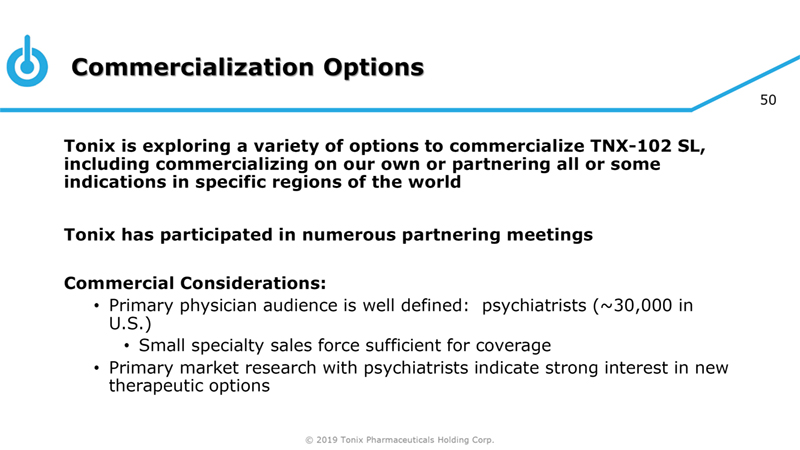
Commercialization Options 50 Tonix is exploring a variety of options to commercialize TNX-102 SL, including commercializing on our own or partnering all or some indications in specific regions of the world Tonix has participated in numerous partnering meetings Commercial Considerations: • Primary physician audience is well defined: psychiatrists (~30,000 in U.S.) • Small specialty sales force sufficient for coverage • Primary market research with psychiatrists indicate strong interest in new therapeutic options © 2019 Tonix Pharmaceuticals Holding Corp.
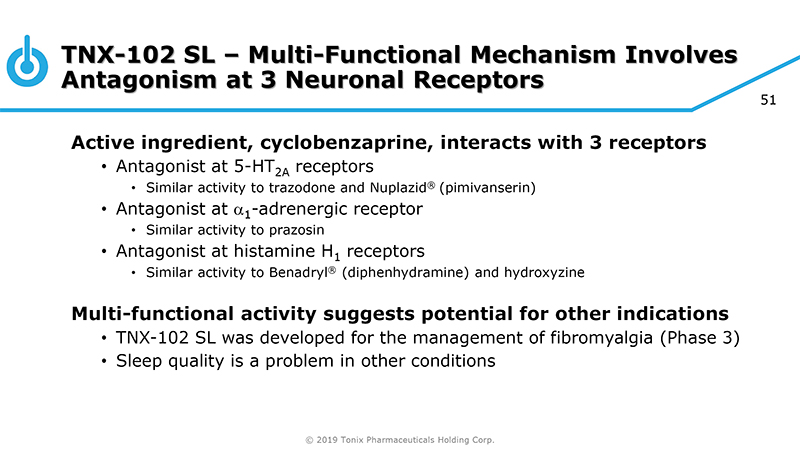
TNX 102 SL – Multi Functional Mechanism Involves Antagonism at 3 Neuronal Receptors 51 Active ingredient, cyclobenzaprine, interacts with 3 receptors • Antagonist at 5-HT2A receptors • Similar activity to trazodone and Nuplazid® (pimivanserin) • Antagonist at α1-adrenergic receptor • Similar activity to prazosin • Antagonist at histamine H1 receptors • Similar activity to Benadryl® (diphenhydramine) and hydroxyzine Multi-functional activity suggests potential for other indications • TNX-102 SL was developed for the management of fibromyalgia (Phase 3) • Sleep quality is a problem in other conditions © 2019 Tonix Pharmaceuticals Holding Corp.
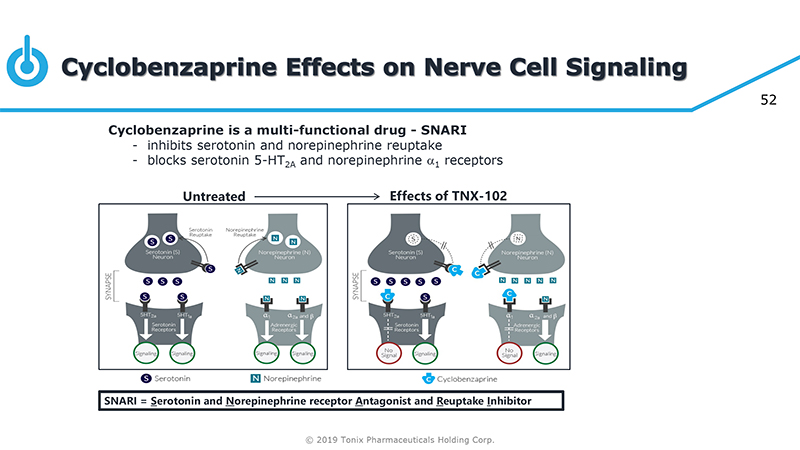
52 Cyclobenzaprine is a multi-functional drug - SNARI - inhibits serotonin and norepinephrine reuptake - blocks serotonin 5-HT2A and norepinephrine α1 receptors Untreated Effects of TNX-102 SNARI = Serotonin and Norepinephrine receptor Antagonist and Reuptake Inhibitor © 2019 Tonix Pharmaceuticals Holding Corp.
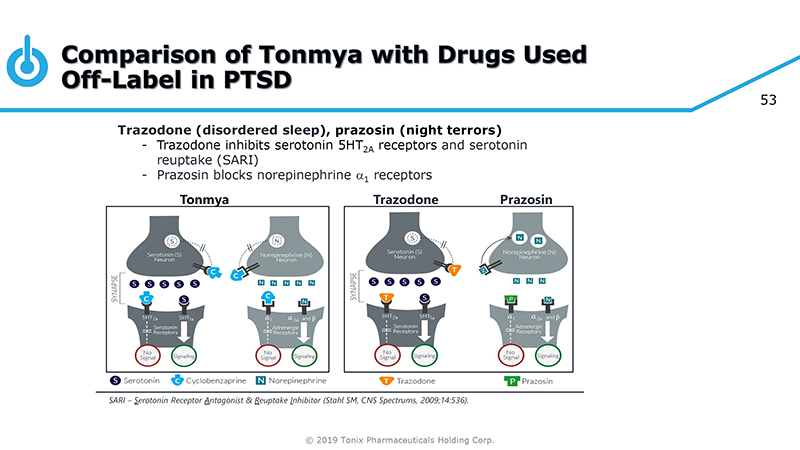
53 Trazodone (disordered sleep), prazosin (night terrors) - Trazodone inhibits serotonin 5HT2A receptors and serotonin reuptake (SARI) - Prazosin blocks norepinephrine α1 receptors Tonmya Trazodone Prazosin SARI – Serotonin Receptor Antagonist & Reuptake Inhibitor (Stahl SM, CNS Spectrums, 2009;14:536). © 2019 Tonix Pharmaceuticals Holding Corp.
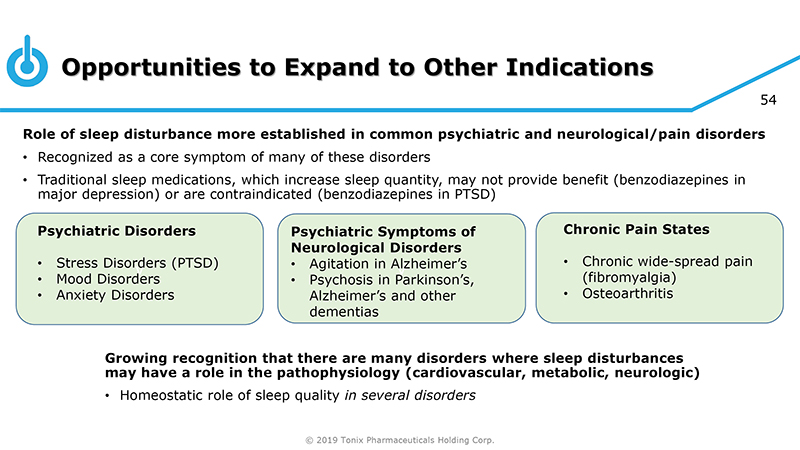
Opportunities to Expand to Other Indications 54 Role of sleep disturbance more established in common psychiatric and neurological/pain disorders • Recognized as a core symptom of many of these disorders • Traditional sleep medications, which increase sleep quantity, may not provide benefit (benzodiazepines in major depression) or are contraindicated (benzodiazepines in PTSD) Psychiatric Disorders Psychiatric Symptoms of Chronic Pain States Neurological Disorders • Stress Disorders (PTSD) v • Agitation in Alzheimer’s v • Chronic wide-spread pain • Mood Disorders • Psychosis in Parkinson’s, (fibromyalgia) • Anxiety Disorders Alzheimer’s and other • Osteoarthritis dementias Growing recognition that there are many disorders where sleep disturbances may have a role in the pathophysiology (cardiovascular, metabolic, neurologic) • Homeostatic role of sleep quality in several disorders © 2019 Tonix Pharmaceuticals Holding Corp.
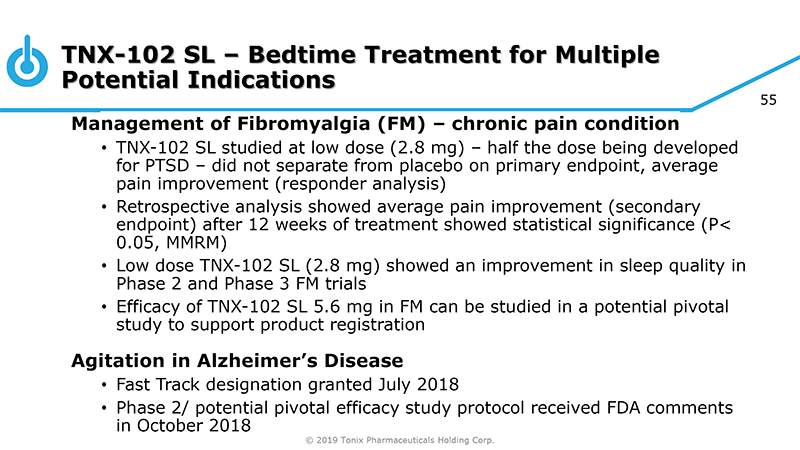
TNX 102 SL – Bedtime Treatment for Multiple Potential Indications 55 Management of Fibromyalgia (FM) – chronic pain condition • TNX-102 SL studied at low dose (2.8 mg) – half the dose being developed for PTSD – did not separate from placebo on primary endpoint, average pain improvement (responder analysis) • Retrospective analysis showed average pain improvement (secondary endpoint) after 12 weeks of treatment showed statistical significance (P< 0.05, MMRM) • Low dose TNX-102 SL (2.8 mg) showed an improvement in sleep quality in Phase 2 and Phase 3 FM trials • Efficacy of TNX-102 SL 5.6 mg in FM can be studied in a potential pivotal study to support product registration Agitation in Alzheimer’s Disease • Fast Track designation granted July 2018 • Phase 2/ potential pivotal efficacy study protocol received FDA comments in October 2018 © 2019 Tonix Pharmaceuticals Holding Corp.
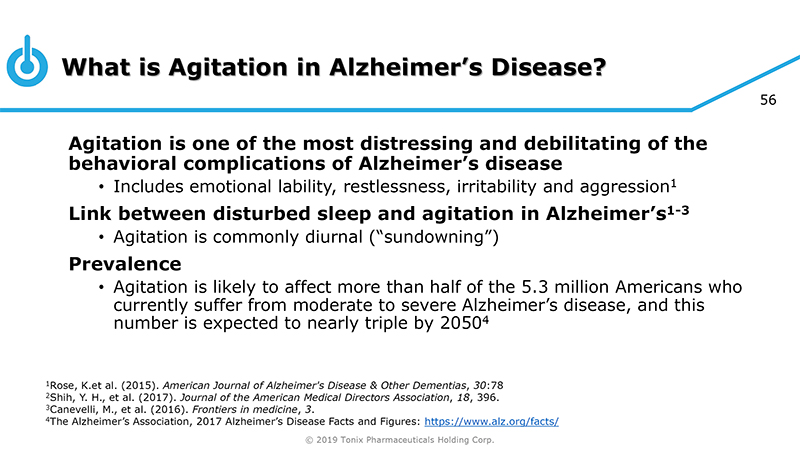
What is Agitation in Alzheimer’s Disease? 56 Agitation is one of the most distressing and debilitating of the behavioral complications of Alzheimer’s disease • Includes emotional lability, restlessness, irritability and aggression1 Link between disturbed sleep and agitation in Alzheimer’s1-3 • Agitation is commonly diurnal (“sundowning”) Prevalence • Agitation is likely to affect more than half of the 5.3 million Americans who currently suffer from moderate to severe Alzheimer’s disease, and this number is expected to nearly triple by 20504 1Rose, K.et al. (2015). American Journal of Alzheimer’s Disease & Other Dementias, 30:78 2Shih, Y. H., et al. (2017). Journal of the American Medical Directors Association, 18, 396. 3Canevelli, M., et al. (2016). Frontiers in medicine, 3. 4The Alzheimer’s Association, 2017 Alzheimer’s Disease Facts and Figures: https://www.alz.org/facts/ © 2019 Tonix Pharmaceuticals Holding Corp.
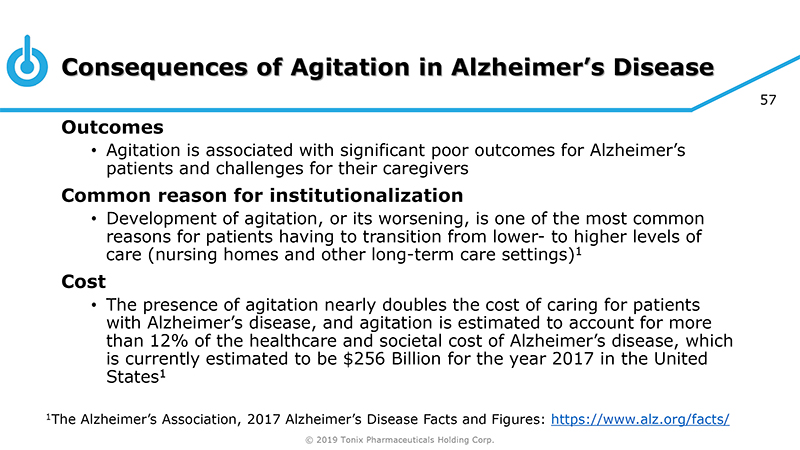
Consequences of Agitation in Alzheimer’s Disease 57 Outcomes • Agitation is associated with significant poor outcomes for Alzheimer’s patients and challenges for their caregivers Common reason for institutionalization • Development of agitation, or its worsening, is one of the most common reasons for patients having to transition from lower- to higher levels of care (nursing homes and other long-term care settings)1 Cost • The presence of agitation nearly doubles the cost of caring for patients with Alzheimer’s disease, and agitation is estimated to account for more than 12% of the healthcare and societal cost of Alzheimer’s disease, which is currently estimated to be $256 Billion for the year 2017 in the United States1 1The Alzheimer’s Association, 2017 Alzheimer’s Disease Facts and Figures: https://www.alz.org/facts/ © 2019 Tonix Pharmaceuticals Holding Corp.
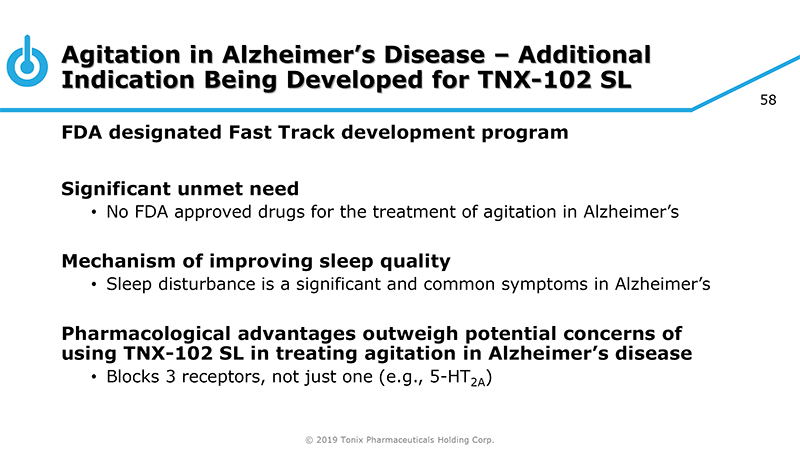
Agitation in Alzheimer’s Disease – Additional Indication Being Developed for TNX 102 SL 58 FDA designated Fast Track development program Significant unmet need • No FDA approved drugs for the treatment of agitation in Alzheimer’s Mechanism of improving sleep quality • Sleep disturbance is a significant and common symptoms in Alzheimer’s Pharmacological advantages outweigh potential concerns of using TNX-102 SL in treating agitation in Alzheimer’s disease • Blocks 3 receptors, not just one (e.g., 5-HT2A) © 2019 Tonix Pharmaceuticals Holding Corp.
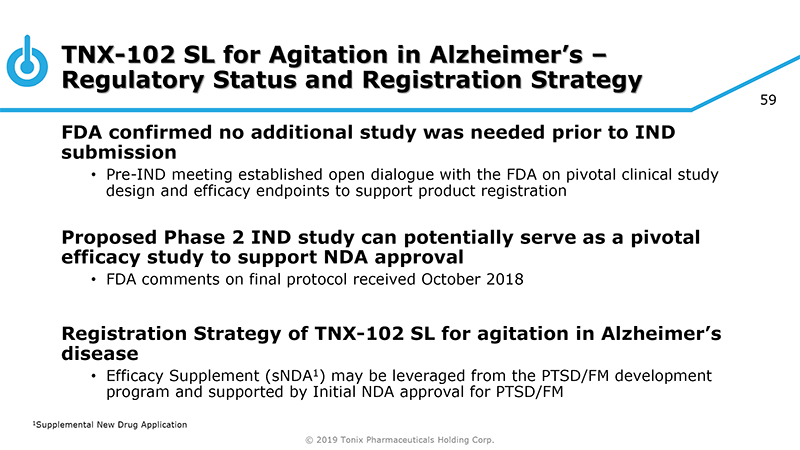
TNX 102 SL for Agitation in Alzheimer’s –Regulatory Status and Registration Strategy 59 FDA confirmed no additional study was needed prior to IND submission • Pre-IND meeting established open dialogue with the FDA on pivotal clinical study design and efficacy endpoints to support product registration Proposed Phase 2 IND study can potentially serve as a pivotal efficacy study to support NDA approval • FDA comments on final protocol received October 2018 Registration Strategy of TNX-102 SL for agitation in Alzheimer’s disease • Efficacy Supplement (sNDA1) may be leveraged from the PTSD/FM development program and supported by Initial NDA approval for PTSD/FM 1Supplemental New Drug Application © 2019 Tonix Pharmaceuticals Holding Corp.
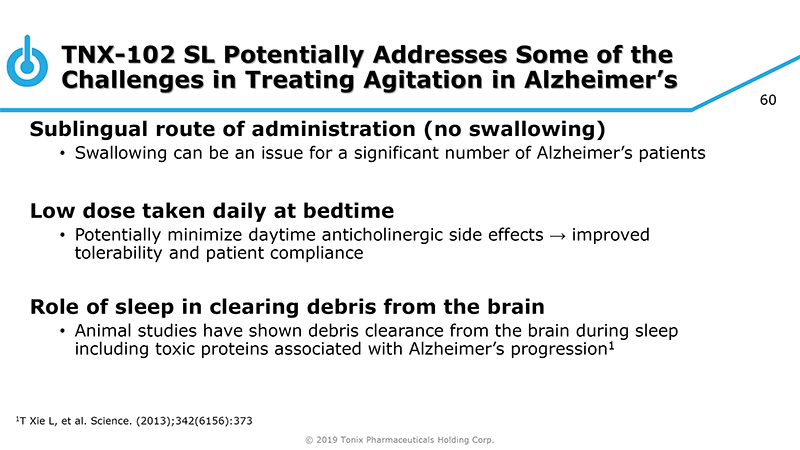
TNX 102 SL Potentially Addresses Some of the Challenges in Treating Agitation in Alzheimer’s 60 Sublingual route of administration (no swallowing) • Swallowing can be an issue for a significant number of Alzheimer’s patients Low dose taken daily at bedtime • Potentially minimize daytime anticholinergic side effects → improved tolerability and patient compliance Role of sleep in clearing debris from the brain • Animal studies have shown debris clearance from the brain during sleep including toxic proteins associated with Alzheimer’s progression1 1T Xie L, et al. Science. (2013);342(6156):373 © 2019 Tonix Pharmaceuticals Holding Corp.
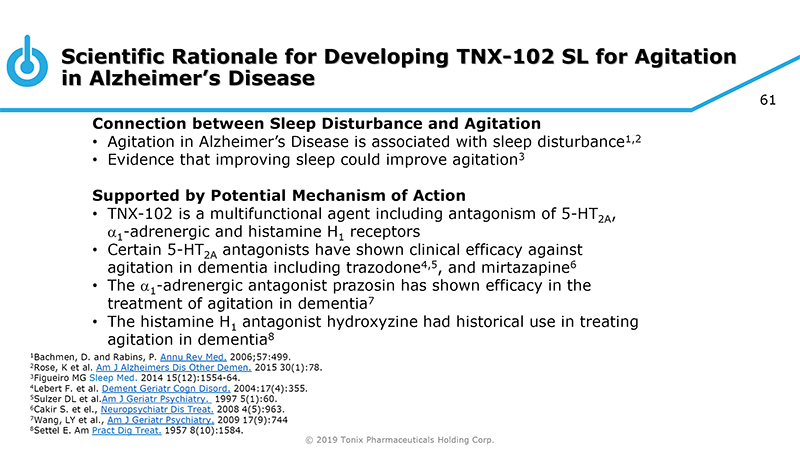
Scientific Rationale for Developing TNX 102 SL for Agitation in Alzheimer’s Disease 61 Connection between Sleep Disturbance and Agitation • Agitation in Alzheimer’s Disease is associated with sleep disturbance1,2 • Evidence that improving sleep could improve agitation3 Supported by Potential Mechanism of Action • TNX-102 is a multifunctional agent including antagonism of 5-HT2A, α 1-adrenergic and histamine H1 receptors • Certain 5-HT2A antagonists have shown clinical efficacy against agitation in dementia including trazodone4,5, and mirtazapine6 • The α1-adrenergic antagonist prazosin has shown efficacy in the treatment of agitation in dementia7 • The histamine H1 antagonist hydroxyzine had historical use in treating agitation in dementia8 1Bachmen, D. and Rabins, P. Annu Rev Med. 2006;57:499. 2Rose, K et al. Am J Alzheimers Dis Other Demen. 2015 30(1):78. 3Figueiro MG Sleep Med. 2014 15(12):1554-64. 4Lebert F. et al. Dement Geriatr Cogn Disord. 2004:17(4):355. 5Sulzer DL et al.Am J Geriatr Psychiatry. 1997 5(1):60. 6Cakir S. et el., Neuropsychiatr Dis Treat. 2008 4(5):963. 7Wang, LY et al., Am J Geriatr Psychiatry. 2009 17(9):744 8Settel E. Am Pract Dig Treat. 1957 8(10):1584. © 2019 Tonix Pharmaceuticals Holding Corp.
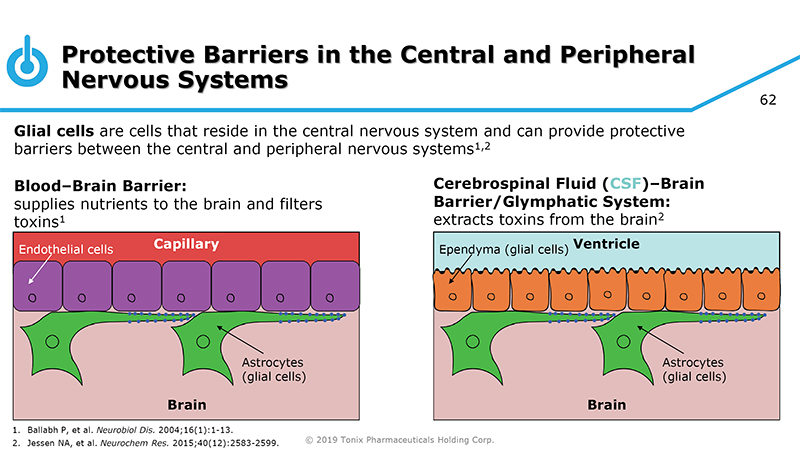
Protective Barriers in the Central and Peripheral Nervous Systems 62 Glial cells are cells that reside in the central nervous system and can provide protective barriers between the central and peripheral nervous systems1,2 Blood–Brain Barrier: Cerebrospinal Fluid (CSF)–Brain supplies nutrients to the brain and filters Barrier/Glymphatic System: toxins1 extracts toxins from the brain2 Endothelial cells Capillary Ependyma (glial cells) Ventricle Astrocytes Astrocytes (glial cells) (glial cells) Brain Brain 1. Ballabh P, et al. Neurobiol Dis. 2004;16(1):1-13. 2. Jessen NA, et al. Neurochem Res. 2015;40(12):2583-2599. © 2019 Tonix Pharmaceuticals Holding Corp.
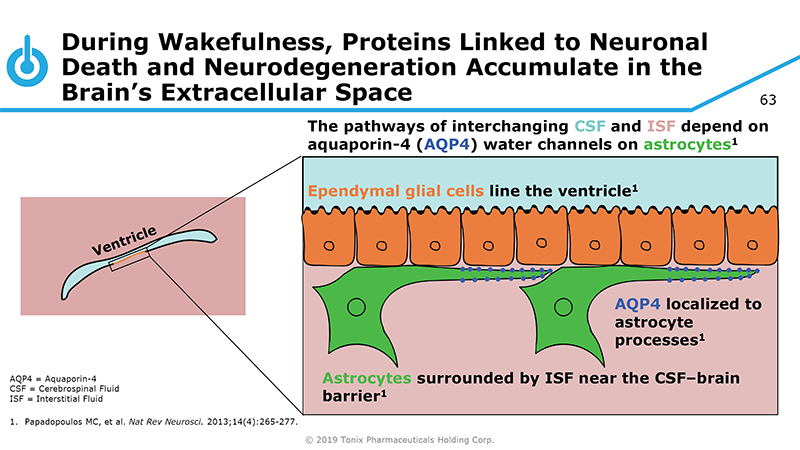
During Wakefulness, Proteins Linked to Neuronal Death and Neurodegeneration Accumulate in the Brain’s Extracellular Space 63 The pathways of interchanging CSF and ISF depend on aquaporin-4 (AQP4) water channels on astrocytes1 Ependymal glial cells line the ventricle1 AQP4 localized to astrocyte processes1 AQP4 = Aquaporin-4 Astrocytes surrounded by ISF near the CSF–brain CSF = Cerebrospinal Fluid barrier1 ISF = Interstitial Fluid 1. Papadopoulos MC, et al. Nat Rev Neurosci. 2013;14(4):265-277. © 2019 Tonix Pharmaceuticals Holding Corp.
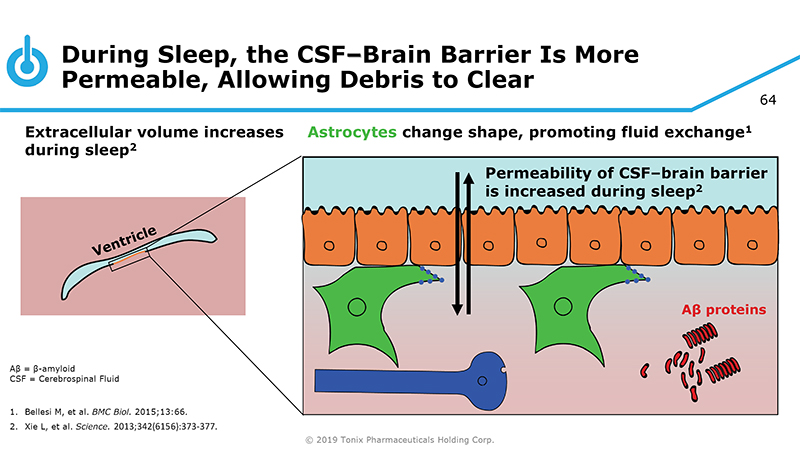
During Sleep, the CSF–Brain Barrier Is More Permeable, Allowing Debris to Clear 64 Extracellular volume increases Astrocytes change shape, promoting fluid exchange1 during sleep2 Permeability of CSF–brain barrier is increased during sleep2 Aβ = β-amyloid CSF = Cerebrospinal Fluid 1. Bellesi M, et al. BMC Biol. 2015;13:66. 2. Xie L, et al. Science. 2013;342(6156):373-377. © 2019 Tonix Pharmaceuticals Holding Corp.
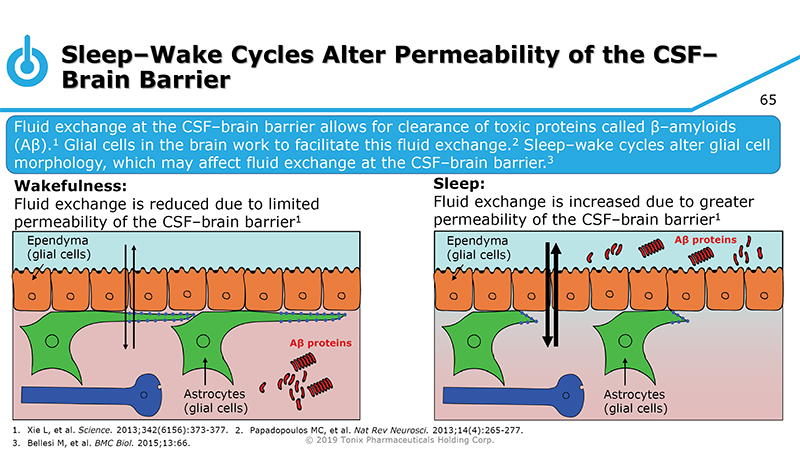
Sleep Wake Cycles Alter Permeability of the CSF–Brain Barrier 65 Fluid exchange at the CSF–brain barrier allows for clearance of toxic proteins called β–amyloids (Aβ).1 Glial cells in the brain work to facilitate this fluid exchange.2 Sleep–wake cycles alter glial cell morphology, which may affect fluid exchange at the CSF–brain barrier.3 Wakefulness: Sleep: Fluid exchange is reduced due to limited Fluid exchange is increased due to greater permeability of the CSF–brain barrier1 permeability of the CSF–brain barrier1 Ependyma Ependyma (glial cells) (glial cells) Astrocytes Astrocytes (glial cells) (glial cells) 1. Xie L, et al. Science. 2013;342(6156):373-377. 2. Papadopoulos MC, et al. Nat Rev Neurosci. 2013;14(4):265-277. 3. Bellesi M, et al. BMC Biol. 2015;13:66. © 2019 Tonix Pharmaceuticals Holding Corp.
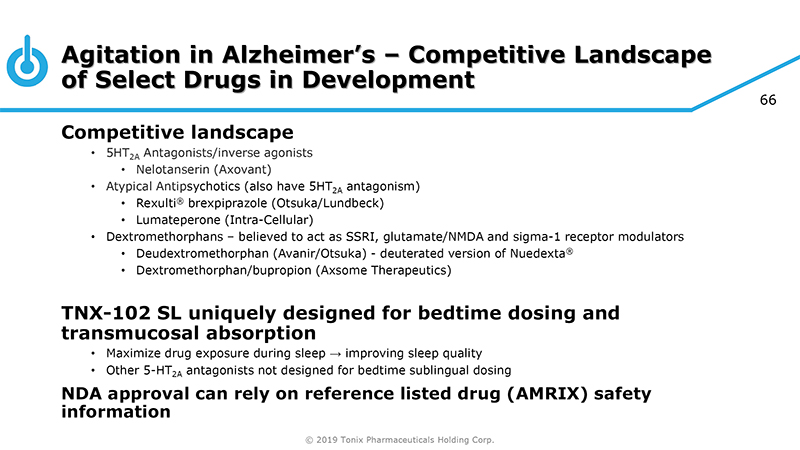
Agitation in Alzheimer’s – Competitive Landscape of Select Drugs in Development 66 Competitive landscape • 5HT2A Antagonists/inverse agonists • Nelotanserin (Axovant) • Atypical Antipsychotics (also have 5HT2A antagonism) • Rexulti® brexpiprazole (Otsuka/Lundbeck) • Lumateperone (Intra-Cellular) • Dextromethorphans – believed to act as SSRI, glutamate/NMDA and sigma-1 receptor modulators • Deudextromethorphan (Avanir/Otsuka) - deuterated version of Nuedexta® • Dextromethorphan/bupropion (Axsome Therapeutics) TNX-102 SL uniquely designed for bedtime dosing and transmucosal absorption • Maximize drug exposure during sleep → improving sleep quality • Other 5-HT2A antagonists not designed for bedtime sublingual dosing NDA approval can rely on reference listed drug (AMRIX) safety information © 2019 Tonix Pharmaceuticals Holding Corp.
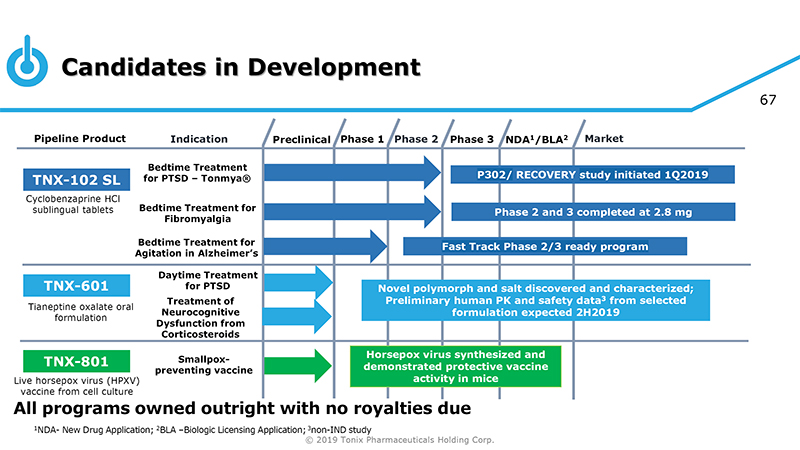
Candidates in Development 67 Pipeline Product Indication Preclinical Phase 1 Phase 2 Phase 3 NDA1/BLA2 Market Bedtime Treatment TNX-102 SL for PTSD – Tonmya® P302/ RECOVERY study initiated 1Q2019 Cyclobenzaprine HCl sublingual tablets Bedtime Treatment for Phase 2 and 3 completed at 2.8 mg Fibromyalgia Bedtime Treatment for Fast Track Phase 2/3 ready program Agitation in Alzheimer’s Daytime Treatment TNX-601 for PTSD Novel polymorph and salt discovered and characterized; Treatment of Preliminary human PK and safety data3 from selected Tianeptine oxalate oral Neurocognitive formulation expected 2H2019 formulation Dysfunction from Corticosteroids TNX-801 Smallpox- Horsepox virus synthesized and preventing vaccine demonstrated protective vaccine Live horsepox virus (HPXV) activity in mice vaccine from cell culture All programs owned outright with no royalties due 1NDA- New Drug Application; 2BLA –Biologic Licensing Application;3non-IND study © 2019 Tonix Pharmaceuticals Holding Corp.
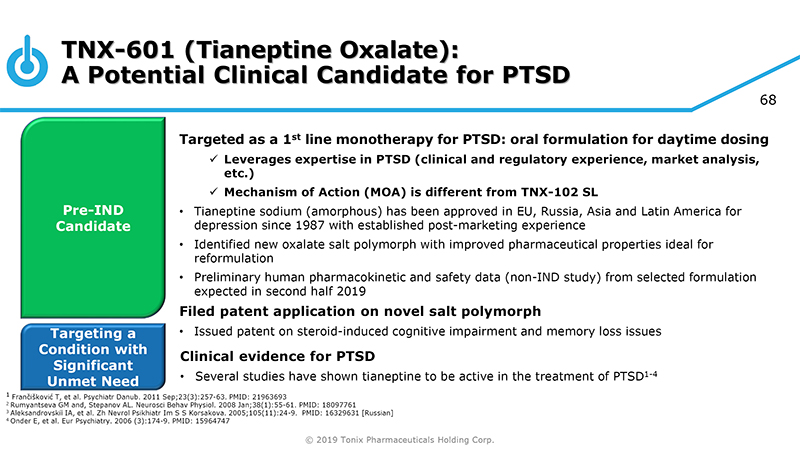
TNX 601 Tianeptine Oxalate): A Potential Clinical Candidate for PTSD 68 Targeted as a 1st line monotherapy for PTSD: oral formulation for daytime dosing ✓✓Leverages expertise in PTSD (clinical and regulatory experience, market analysis, etc.)✓Mechanism of Action (MOA) is different from TNX-102 SL Pre-IND • Tianeptine sodium (amorphous) has been approved in EU, Russia, Asia and Latin America for Candidate depression since 1987 with established post-marketing experience • Identified new oxalate salt polymorph with improved pharmaceutical properties ideal for reformulation • Preliminary human pharmacokinetic and safety data (non-IND study) from selected formulation expected in second half 2019 Filed patent application on novel salt polymorph Targeting a • Issued patent on steroid-induced cognitive impairment and memory loss issues Condition with Clinical evidence for PTSD Significant Unmet Need • Several studies have shown tianeptine to be active in the treatment of PTSD1-4 1 Fran i kovi T, et al. Psychiatr Danub. 2011 Sep;23(3):257-63. PMID: 21963693 2 Rumyantseva GM and, Stepanov AL. Neurosci Behav Physiol. 2008 Jan;38(1):55-61. PMID: 18097761 3 Aleksandrovski IA, et al. Zh Nevrol Psikhiatr Im S S Korsakova. 2005;105(11):24-9. PMID: 16329631 [Russian] 4 Onder E, et al. Eur Psychiatry. 2006 (3):174-9. PMID: 15964747 © 2019 Tonix Pharmaceuticals Holding Corp.
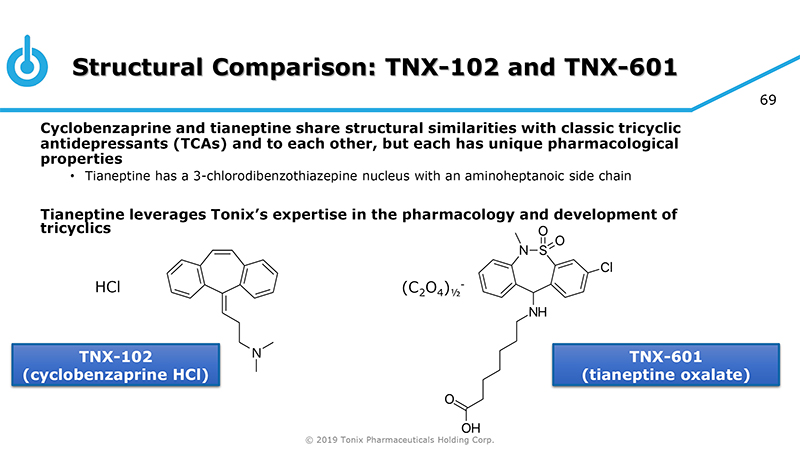
Structural Comparison: TNX 102 and TNX 601 69 Cyclobenzaprine and tianeptine share structural similarities with classic tricyclic antidepressants (TCAs) and to each other, but each has unique pharmacological properties • Tianeptine has a 3-chlorodibenzothiazepine nucleus with an aminoheptanoic side chain Tianeptine leverages Tonix’s expertise in the pharmacology and development of tricyclics HCl (C2O4)½- TNX-102 TNX-601 (cyclobenzaprine HCl) (tianeptine oxalate) © 2019 Tonix Pharmaceuticals Holding Corp.
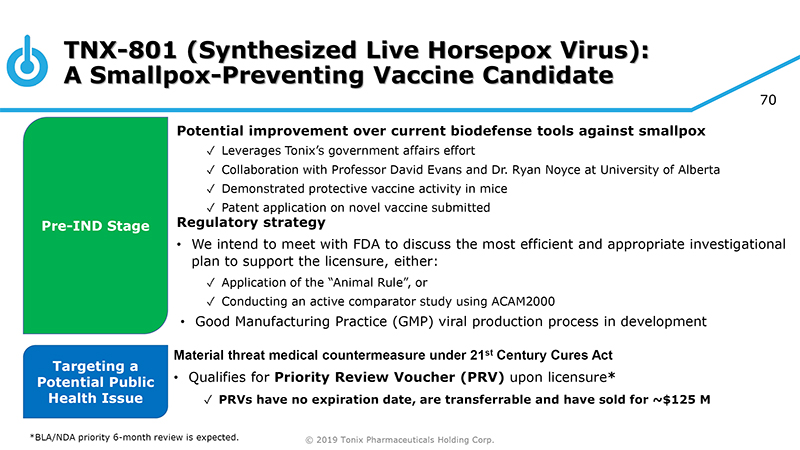
TNX 801 (Synthesized Live Horsepox Virus): A Smallpox Preventing Vaccine Candidate 70 Potential improvement over current biodefense tools against smallpox Leverages Tonix’s government affairs effort Collaboration with Professor David Evans and Dr. Ryan Noyce at University of Alberta Demonstrated protective vaccine activity in mice Patent application on novel vaccine submitted Pre-IND Stage Regulatory strategy • We intend to meet with FDA to discuss the most efficient and appropriate investigational plan to support the licensure, either: Application of the “Animal Rule”, or Conducting an active comparator study using ACAM2000 • Good Manufacturing Practice (GMP) viral production process in development Material threat medical countermeasure under 21st Century Cures Act Targeting a Potential Public • Qualifies for Priority Review Voucher (PRV) upon licensure* Health Issue PRVs have no expiration date, are transferrable and have sold for ~$125 M *BLA/NDA priority 6-month review is expected. © 2019 Tonix Pharmaceuticals Holding Corp.
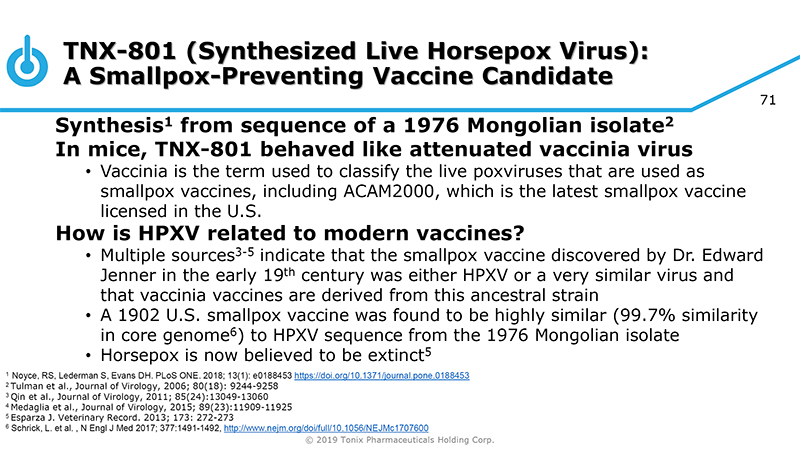
TNX 801 (Synthesized Live Horsepox Virus): A Smallpox Preventing Vaccine Candidate 71 Synthesis1 from sequence of a 1976 Mongolian isolate2 In mice, TNX-801 behaved like attenuated vaccinia virus • Vaccinia is the term used to classify the live poxviruses that are used as smallpox vaccines, including ACAM2000, which is the latest smallpox vaccine licensed in the U.S. How is HPXV related to modern vaccines? • Multiple sources3-5 indicate that the smallpox vaccine discovered by Dr. Edward Jenner in the early 19th century was either HPXV or a very similar virus and that vaccinia vaccines are derived from this ancestral strain • A 1902 U.S. smallpox vaccine was found to be highly similar (99.7% similarity in core genome6) to HPXV sequence from the 1976 Mongolian isolate • Horsepox is now believed to be extinct5 1 Noyce, RS, Lederman S, Evans DH. PLoS ONE. 2018; 13(1): e0188453 https://doi.org/10.1371/journal.pone.0188453 2 Tulman et al., Journal of Virology, 2006; 80(18): 9244-9258 3 Qin et al., Journal of Virology, 2011; 85(24):13049-13060 4 Medaglia et al., Journal of Virology, 2015; 89(23):11909-11925 5 Esparza J. Veterinary Record. 2013; 173: 272-273 6 Schrick, L. et al. , N Engl J Med 2017; 377:1491-1492, http://www.nejm.org/doi/full/10.1056/NEJMc1707600 © 2019 Tonix Pharmaceuticals Holding Corp.
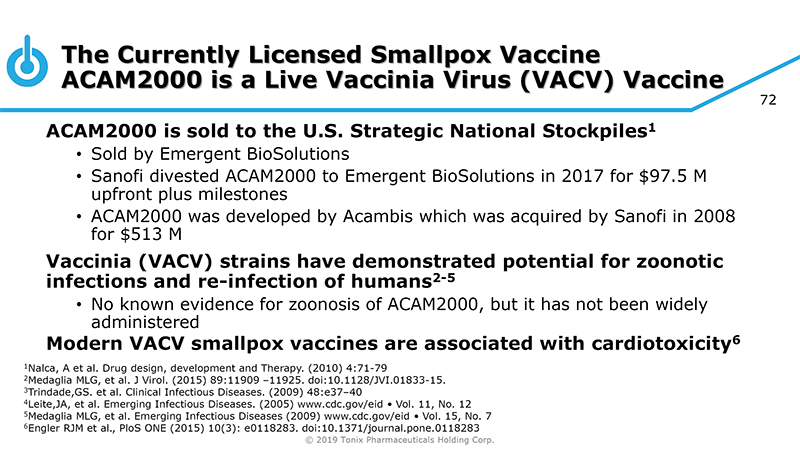
The Currently Licensed Smallpox Vaccine ACAM2000 is a Live Vaccinia Virus (VACV) Vaccine 72 ACAM2000 is sold to the U.S. Strategic National Stockpiles1 • Sold by Emergent BioSolutions • Sanofi divested ACAM2000 to Emergent BioSolutions in 2017 for $97.5 M upfront plus milestones • ACAM2000 was developed by Acambis which was acquired by Sanofi in 2008 for $513 M Vaccinia (VACV) strains have demonstrated potential for zoonotic infections and re-infection of humans2-5 • No known evidence for zoonosis of ACAM2000, but it has not been widely administered Modern VACV smallpox vaccines are associated with cardiotoxicity6 1Nalca, A et al. Drug design, development and Therapy. (2010) 4:71-79 2Medaglia MLG, et al. J Virol. (2015) 89:11909 –11925. doi:10.1128/JVI.01833-15. 3Trindade,GS. et al. Clinical Infectious Diseases. (2009) 48:e37–40 4Leite,JA, et al. Emerging Infectious Diseases. (2005) www.cdc.gov/eid • Vol. 11, No. 12 5Medaglia MLG, et al. Emerging Infectious Diseases (2009) www.cdc.gov/eid • Vol. 15, No. 7 6Engler RJM et al., PloS ONE (2015) 10(3): e0118283. doi:10.1371/journal.pone.0118283 © 2019 Tonix Pharmaceuticals Holding Corp.
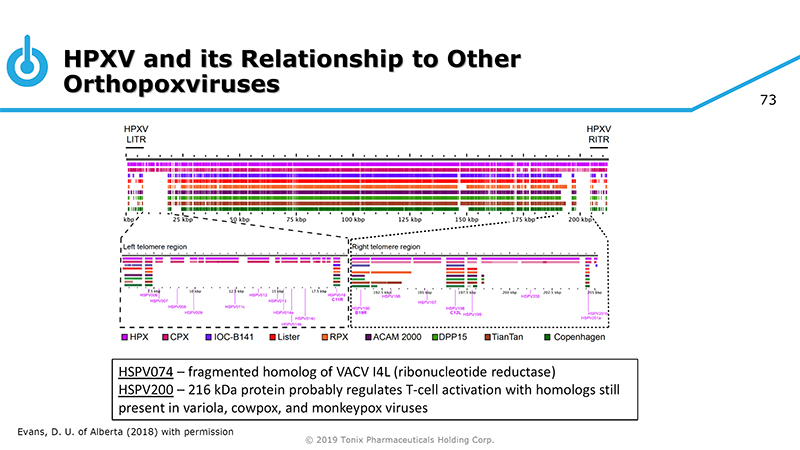
HPXV and its Relationship to Other Orthopoxviruses 73 HSPV074 – fragmented homolog of VACV I4L (ribonucleotide reductase) HSPV200 – 216 kDa protein probably regulates T-cell activation with homologs still present in variola, cowpox, and monkeypox viruses Evans, D. U. of Alberta (2018) with permission © 2019 Tonix Pharmaceuticals Holding Corp.
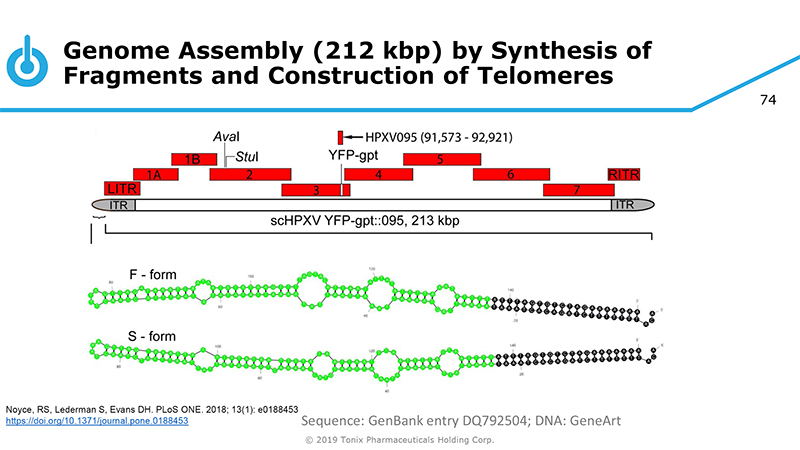
Genome Assembly (212 kbp) by Synthesis of Fragments and Construction of Telomeres 74 Noyce, RS, Lederman S, Evans DH. PLoS ONE. 2018; 13(1): e0188453 https://doi.org/10.1371/journal.pone.0188453 Sequence: GenBank entry DQ792504; DNA: GeneArt © 2019 Tonix Pharmaceuticals Holding Corp.
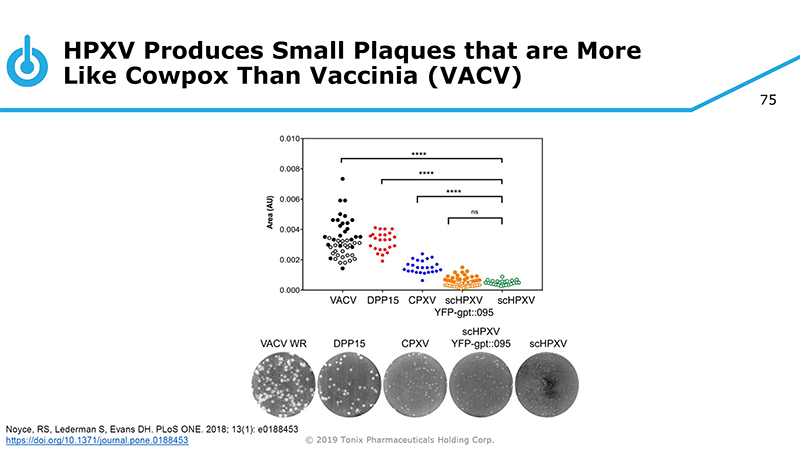
HPXV Produces Small Plaques that are More Like Cowpox Than Vaccinia (VACV) 75 Noyce, RS, Lederman S, Evans DH. PLoS ONE. 2018; 13(1): e0188453 https://doi.org/10.1371/journal.pone.0188453 © 2019 Tonix Pharmaceuticals Holding Corp.
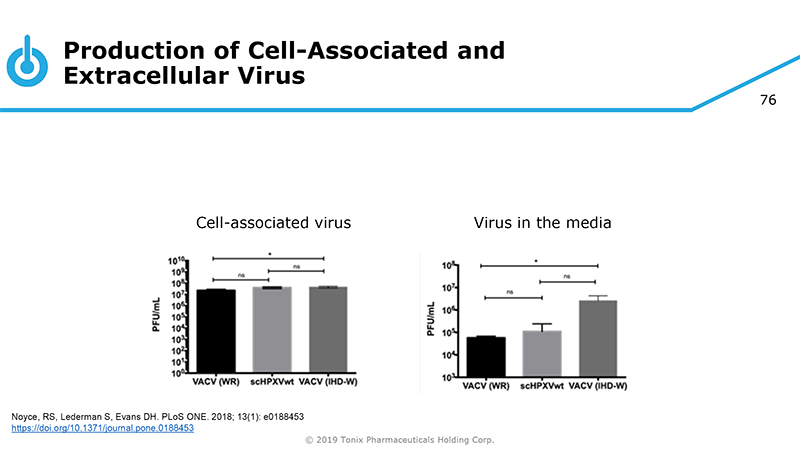
Production of Cell-Associated and Extracellular Virus 76 Cell-associated virus Virus in the media Noyce, RS, Lederman S, Evans DH. PLoS ONE. 2018; 13(1): e0188453 https://doi.org/10.1371/journal.pone.0188453 © 2019 Tonix Pharmaceuticals Holding Corp.
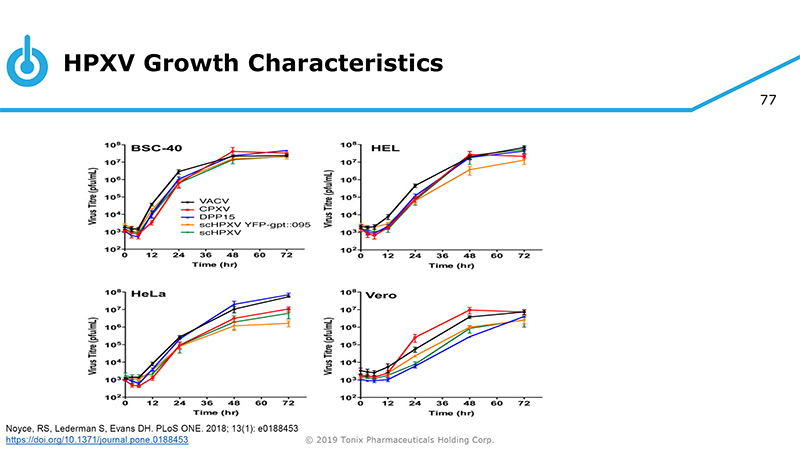
HPXV Growth Characteristics 77 Noyce, RS, Lederman S, Evans DH. PLoS ONE. 2018; 13(1): e0188453 https://doi.org/10.1371/journal.pone.0188453 © 2019 Tonix Pharmaceuticals Holding Corp.
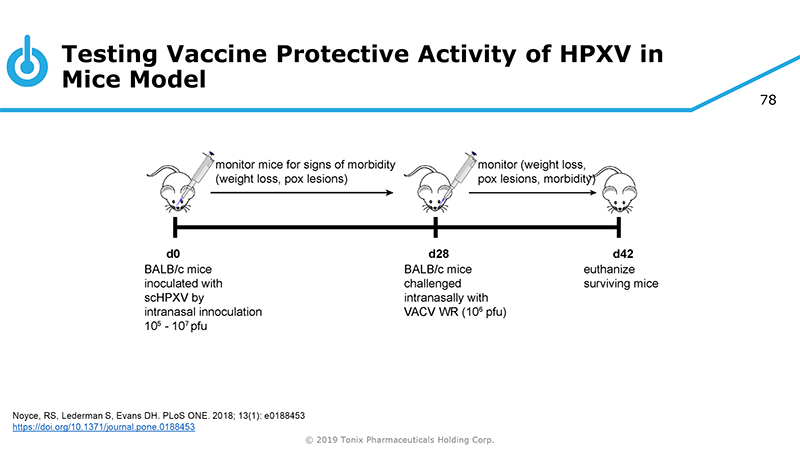
Testing Vaccine Protective Activity of HPXV in Mice Model 78 Noyce, RS, Lederman S, Evans DH. PLoS ONE. 2018; 13(1): e0188453 https://doi.org/10.1371/journal.pone.0188453 © 2019 Tonix Pharmaceuticals Holding Corp.
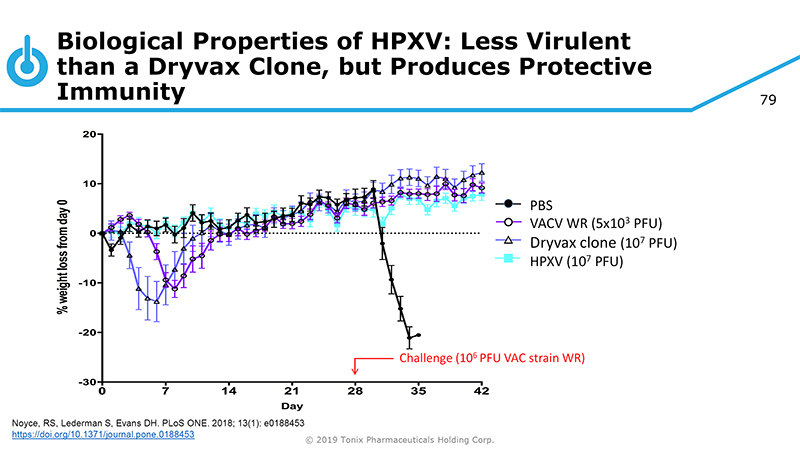
Biological Properties of HPXV: Less Virulent than a Dryvax Clone, but Produces Protective Immunity 79 PBS VACV WR (5x103 PFU) Dryvax clone (107 PFU) HPXV (107 PFU) Challenge (106 PFU VAC strain WR) Noyce, RS, Lederman S, Evans DH. PLoS ONE. 2018; 13(1): e0188453 https://doi.org/10.1371/journal.pone.0188453 © 2019 Tonix Pharmaceuticals Holding Corp.
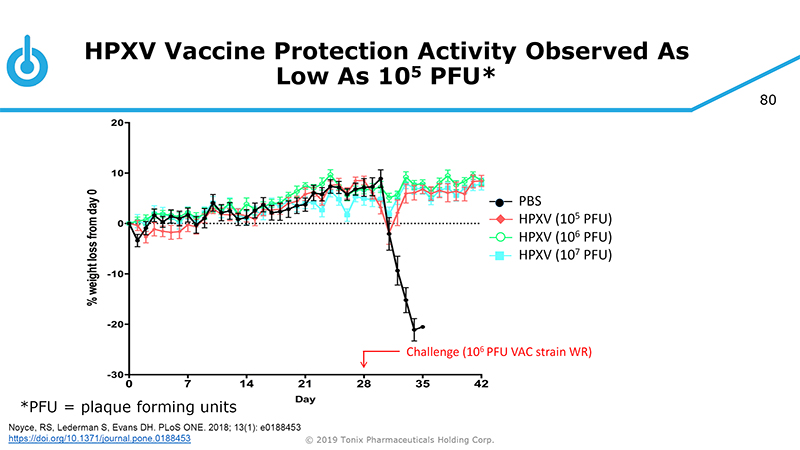
HPXV Vaccine Protection Activity Observed As Low As 105 PFU* 80 PBS HPXV (105 PFU) HPXV (106 PFU) HPXV (107 PFU) Challenge (106 PFU VAC strain WR) *PFU = plaque forming units Noyce, RS, Lederman S, Evans DH. PLoS ONE. 2018; 13(1): e0188453 https://doi.org/10.1371/journal.pone.0188453 © 2019 Tonix Pharmaceuticals Holding Corp.
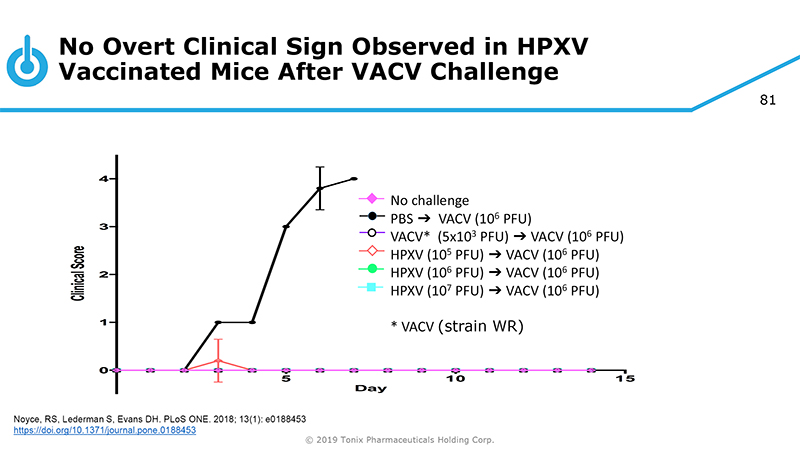
No Overt Clinical Sign Observed in HPXV Vaccinated Mice After VACV Challenge 81 No challenge PBS VACV (106 PFU) VACV* (5x103 PFU) VACV (106 PFU) HPXV (105 PFU) VACV (106 PFU) HPXV (106 PFU) VACV (106 PFU) HPXV (107 PFU) VACV (106 PFU) * VACV (strain WR) Noyce, RS, Lederman S, Evans DH. PLoS ONE. 2018; 13(1): e0188453 https://doi.org/10.1371/journal.pone.0188453 © 2019 Tonix Pharmaceuticals Holding Corp.
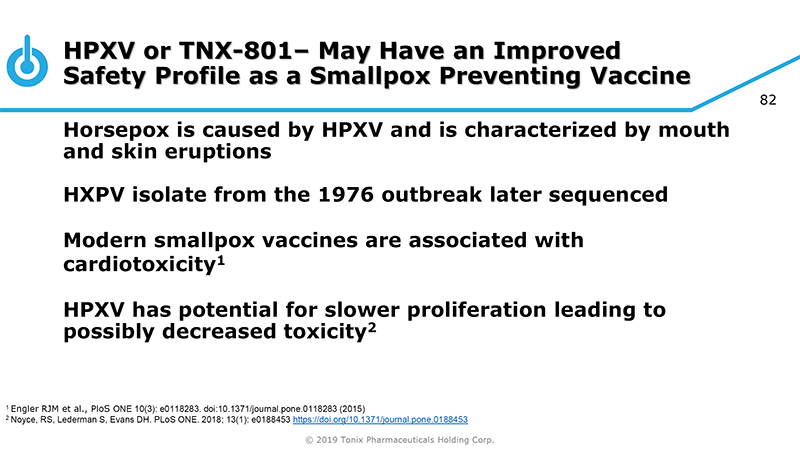
HPXV or TNX 801– May Have an Improved Safety Profile as a Smallpox Preventing Vaccine 82 Horsepox is caused by HPXV and is characterized by mouth and skin eruptions HXPV isolate from the 1976 outbreak later sequenced Modern smallpox vaccines are associated with cardiotoxicity1 HPXV has potential for slower proliferation leading to possibly decreased toxicity2 1 Engler RJM et al., PloS ONE 10(3): e0118283. doi:10.1371/journal.pone.0118283 (2015) 2 Noyce, RS, Lederman S, Evans DH. PLoS ONE. 2018; 13(1): e0188453 https://doi.org/10.1371/journal.pone.0188453 © 2019 Tonix Pharmaceuticals Holding Corp.
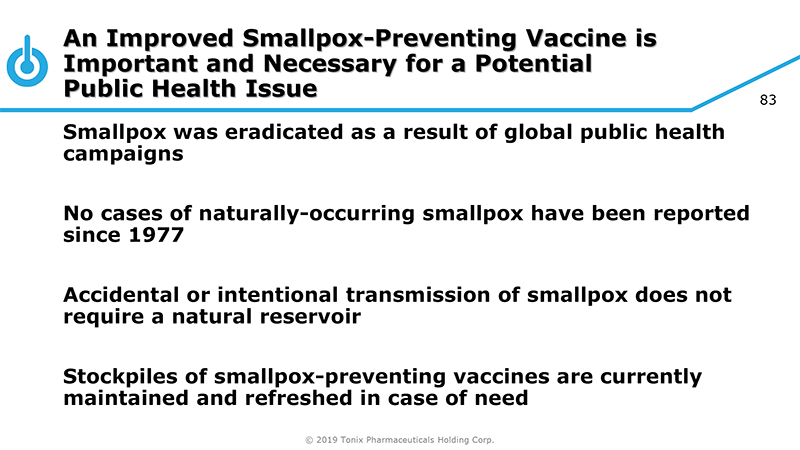
An Improved Smallpox Preventing Vaccine is Important and Necessary for a Potential Public Health Issue 83 Smallpox was eradicated as a result of global public health campaigns No cases of naturally-occurring smallpox have been reported since 1977 Accidental or intentional transmission of smallpox does not require a natural reservoir Stockpiles of smallpox-preventing vaccines are currently maintained and refreshed in case of need © 2019 Tonix Pharmaceuticals Holding Corp.
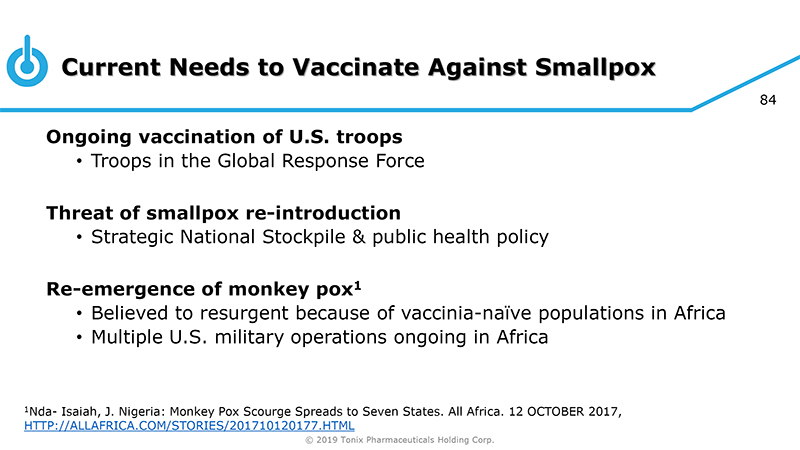
Current Needs to Vaccinate Against Smallpox 84 Ongoing vaccination of U.S. troops • Troops in the Global Response Force Threat of smallpox re-introduction • Strategic National Stockpile & public health policy Re-emergence of monkey pox1 • Believed to resurgent because of vaccinia-naïve populations in Africa • Multiple U.S. military operations ongoing in Africa 1Nda- Isaiah, J. Nigeria: Monkey Pox Scourge Spreads to Seven States. All Africa. 12 OCTOBER 2017, HTTP://ALLAFRICA.COM/STORIES/201710120177.HTML © 2019 Tonix Pharmaceuticals Holding Corp.
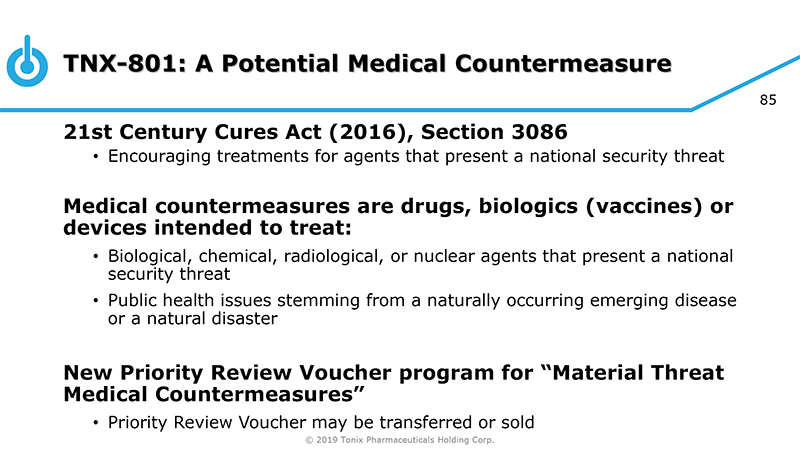
TNX 801: A Potential Medical Countermeasure 85 21st Century Cures Act (2016), Section 3086 • Encouraging treatments for agents that present a national security threat Medical countermeasures are drugs, biologics (vaccines) or devices intended to treat: • Biological, chemical, radiological, or nuclear agents that present a national security threat • Public health issues stemming from a naturally occurring emerging disease or a natural disaster New Priority Review Voucher program for “Material Threat Medical Countermeasures” • Priority Review Voucher may be transferred or sold © 2019 Tonix Pharmaceuticals Holding Corp.
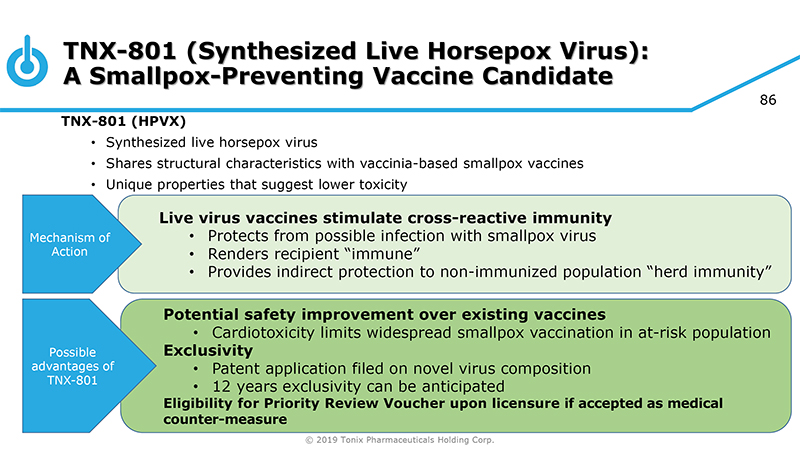
TNX 801 (Synthesized Live Horsepox Virus): A Smallpox Preventing Vaccine Candidate 86 TNX-801 (HPVX) • Synthesized live horsepox virus • Shares structural characteristics with vaccinia-based smallpox vaccines • Unique properties that suggest lower toxicity Live virus vaccines stimulate cross-reactive immunity Mechanism of • Protects from possible infection with smallpox virus Action • Renders recipient “immune” • Provides indirect protection to non-immunized population “herd immunity” Potential safety improvement over existing vaccines • Cardiotoxicity limits widespread smallpox vaccination in at-risk population Possible Exclusivity advantages of • Patent application filed on novel virus composition TNX-801 • 12 years exclusivity can be anticipated Eligibility for Priority Review Voucher upon licensure if accepted as medical counter-measure © 2019 Tonix Pharmaceuticals Holding Corp.
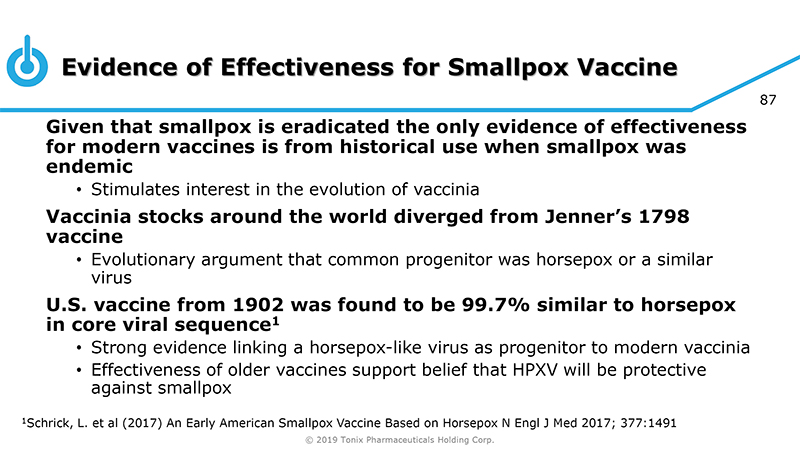
Evidence of Effectiveness for Smallpox Vaccine 87 Given that smallpox is eradicated the only evidence of effectiveness for modern vaccines is from historical use when smallpox was endemic • Stimulates interest in the evolution of vaccinia Vaccinia stocks around the world diverged from Jenner’s 1798 vaccine • Evolutionary argument that common progenitor was horsepox or a similar virus U.S. vaccine from 1902 was found to be 99.7% similar to horsepox in core viral sequence1 • Strong evidence linking a horsepox-like virus as progenitor to modern vaccinia • Effectiveness of older vaccines support belief that HPXV will be protective against smallpox 1Schrick, L. et al (2017) An Early American Smallpox Vaccine Based on Horsepox N Engl J Med 2017; 377:1491 © 2019 Tonix Pharmaceuticals Holding Corp.
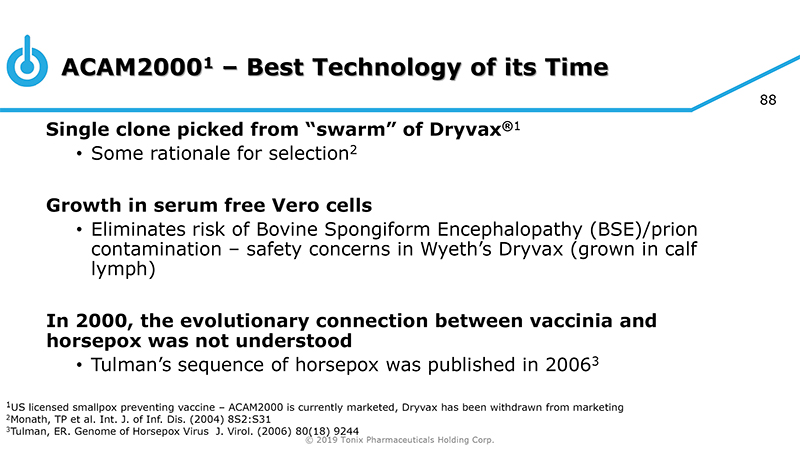
ACAM2000 – Best Technology of its Time 88 Single clone picked from “swarm” of Dryvax®1 • Some rationale for selection2 Growth in serum free Vero cells • Eliminates risk of Bovine Spongiform Encephalopathy (BSE)/prion contamination – safety concerns in Wyeth’s Dryvax (grown in calf lymph) In 2000, the evolutionary connection between vaccinia and horsepox was not understood • Tulman’s sequence of horsepox was published in 20063 1US licensed smallpox preventing vaccine – ACAM2000 is currently marketed, Dryvax has been withdrawn from marketing 2Monath, TP et al. Int. J. of Inf. Dis. (2004) 8S2:S31 3Tulman, ER. Genome of Horsepox Virus J. Virol. (2006) 80(18) 9244 © 2019 Tonix Pharmaceuticals Holding Corp.
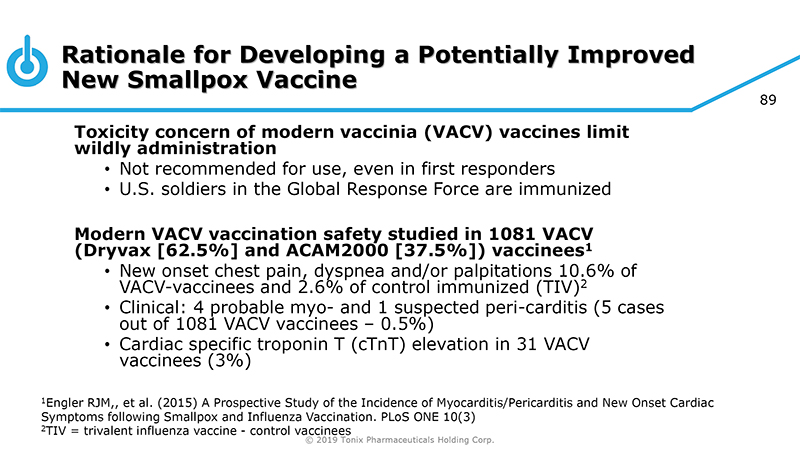
Rationale for Developing a Potentially Improved New Smallpox Vaccine 89 Toxicity concern of modern vaccinia (VACV) vaccines limit wildly administration • Not recommended for use, even in first responders • U.S. soldiers in the Global Response Force are immunized Modern VACV vaccination safety studied in 1081 VACV (Dryvax [62.5%] and ACAM2000 [37.5%]) vaccinees1 • New onset chest pain, dyspnea and/or palpitations 10.6% of VACV-vaccinees and 2.6% of control immunized (TIV)2 • Clinical: 4 probable myo- and 1 suspected peri-carditis (5 cases out of 1081 VACV vaccinees – 0.5%) • Cardiac specific troponin T (cTnT) elevation in 31 VACVvaccinees (3%) 1Engler RJM,, et al. (2015) A Prospective Study of the Incidence of Myocarditis/Pericarditis and New Onset Cardiac Symptoms following Smallpox and Influenza Vaccination. PLoS ONE 10(3) 2TIV = trivalent influenza vaccine - control vaccinees © 2019 Tonix Pharmaceuticals Holding Corp.
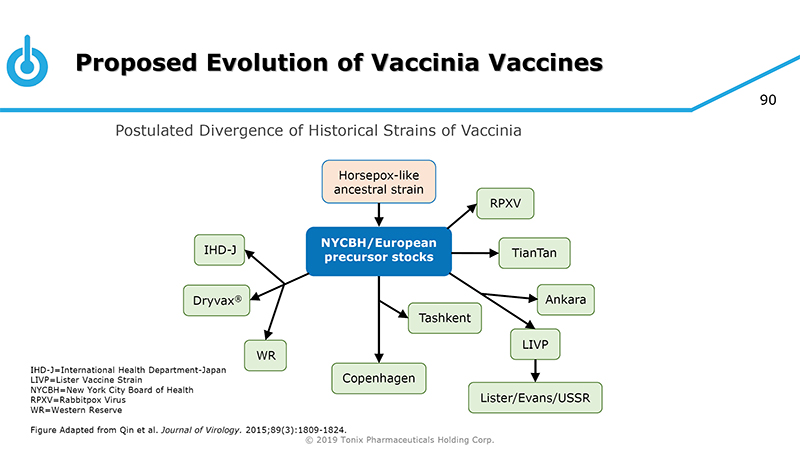
Proposed Evolution of Vaccinia Vaccines 90 Postulated Divergence of Historical Strains of Vaccinia Horsepox-like ancestral strain RPXV NYCBH/European IHD-J TianTan precursor stocks Dryvax® Ankara Tashkent LIVP WR IHD-J=International Health Department-Japan LIVP=Lister Vaccine Strain Copenhagen NYCBH=New York City Board of Health RPXV=Rabbitpox Virus Lister/Evans/USSR WR=Western Reserve Figure Adapted from Qin et al. Journal of Virology. 2015;89(3):1809-1824. © 2019 Tonix Pharmaceuticals Holding Corp.
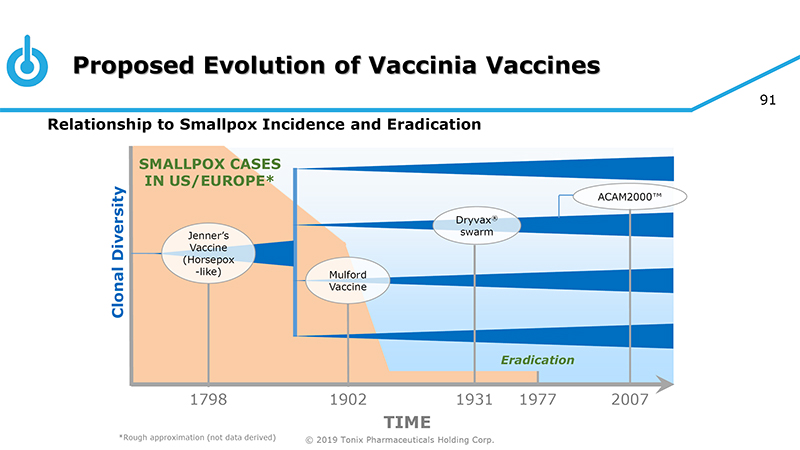
Proposed Evolution of Vaccinia Vaccines 91 Relationship to Smallpox Incidence and Eradication SMALLPOX CASES IN US/EUROPE* ACAM2000™ Dryvax® Jenner’s swarm Vaccine (Horsepox -like) Mulford Clonal Diversity Vaccine Eradication 1798 1902 1931 1977 2007 TIME *Rough approximation (not data derived) © 2019 Tonix Pharmaceuticals Holding Corp.
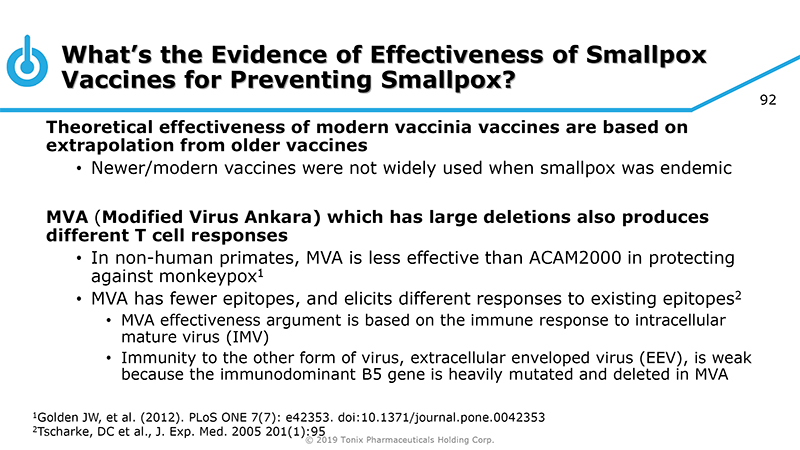
What’s the Evidence of Effectiveness of Smallpox Vaccines for Preventing Smallpox? 92 Theoretical effectiveness of modern vaccinia vaccines are based on extrapolation from older vaccines • Newer/modern vaccines were not widely used when smallpox was endemic MVA (Modified Virus Ankara) which has large deletions also produces different T cell responses • In non-human primates, MVA is less effective than ACAM2000 in protecting against monkeypox1 • MVA has fewer epitopes, and elicits different responses to existing epitopes2 • MVA effectiveness argument is based on the immune response to intracellular mature virus (IMV) • Immunity to the other form of virus, extracellular enveloped virus (EEV), is weak because the immunodominant B5 gene is heavily mutated and deleted in MVA 1Golden JW, et al. (2012). PLoS ONE 7(7): e42353. doi:10.1371/journal.pone.0042353 2Tscharke, DC et al., J. Exp. Med. 2005 201(1):95 © 2019 Tonix Pharmaceuticals Holding Corp.
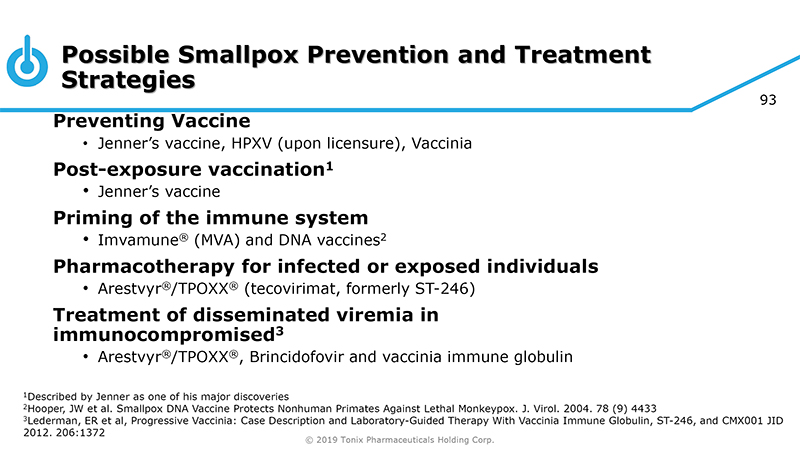
Possible Smallpox Prevention and Treatment Strategies 93 Preventing Vaccine • Jenner’s vaccine, HPXV (upon licensure), Vaccinia Post-exposure vaccination1 • Jenner’s vaccine Priming of the immune system • Imvamune® (MVA) and DNA vaccines2 Pharmacotherapy for infected or exposed individuals • Arestvyr®/TPOXX® (tecovirimat, formerly ST-246) Treatment of disseminated viremia in immunocompromised3 • Arestvyr®/TPOXX®, Brincidofovir and vaccinia immune globulin 1Described by Jenner as one of his major discoveries 2Hooper, JW et al. Smallpox DNA Vaccine Protects Nonhuman Primates Against Lethal Monkeypox. J. Virol. 2004. 78 (9) 4433 3Lederman, ER et al, Progressive Vaccinia: Case Description and Laboratory-Guided Therapy With Vaccinia Immune Globulin, ST-246, and CMX001 JID 2012. 206:1372 © 2019 Tonix Pharmaceuticals Holding Corp.
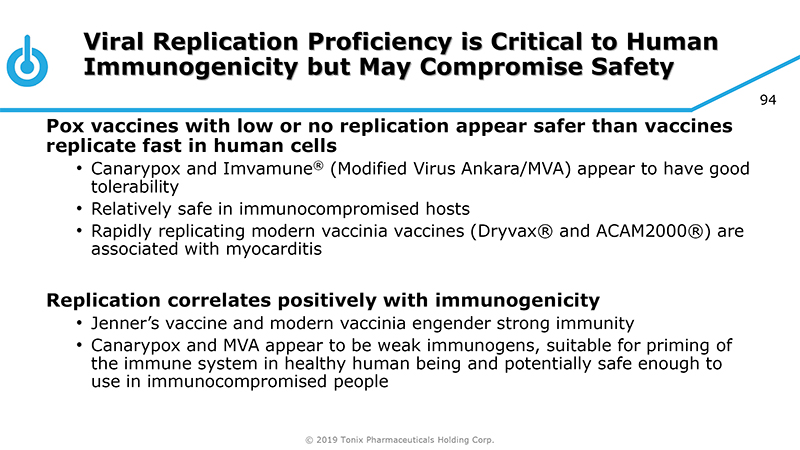
Viral Replication Proficiency is Critical to Human Immunogenicity but May Compromise Safety 94 Pox vaccines with low or no replication appear safer than vaccines replicate fast in human cells • Canarypox and Imvamune® (Modified Virus Ankara/MVA) appear to have good tolerability • Relatively safe in immunocompromised hosts • Rapidly replicating modern vaccinia vaccines (Dryvax® and ACAM2000®) are associated with myocarditis Replication correlates positively with immunogenicity • Jenner’s vaccine and modern vaccinia engender strong immunity • Canarypox and MVA appear to be weak immunogens, suitable for priming of the immune system in healthy human being and potentially safe enough to use in immunocompromised people © 2019 Tonix Pharmaceuticals Holding Corp.
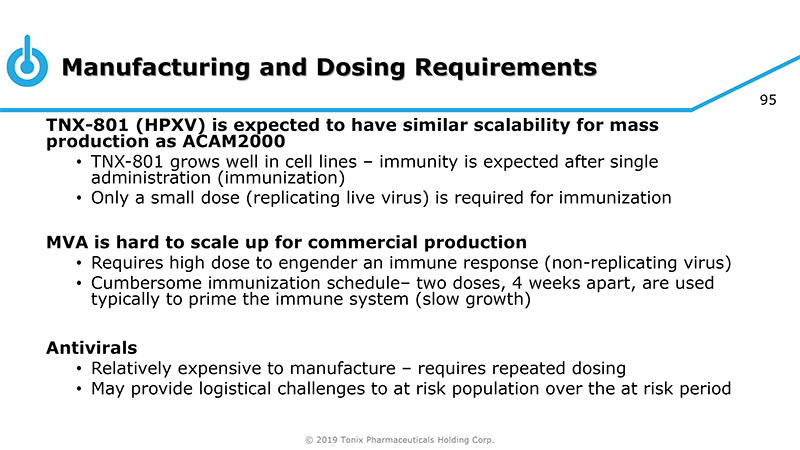
Manufacturing and Dosing Requirements 95 TNX-801 (HPXV) is expected to have similar scalability for mass production as ACAM2000 • TNX-801 grows well in cell lines – immunity is expected after single administration (immunization) • Only a small dose (replicating live virus) is required for immunization MVA is hard to scale up for commercial production • Requires high dose to engender an immune response (non-replicating virus) • Cumbersome immunization schedule– two doses, 4 weeks apart, are used typically to prime the immune system (slow growth) Antivirals • Relatively expensive to manufacture – requires repeated dosing • May provide logistical challenges to at risk population over the at risk period © 2019 Tonix Pharmaceuticals Holding Corp.
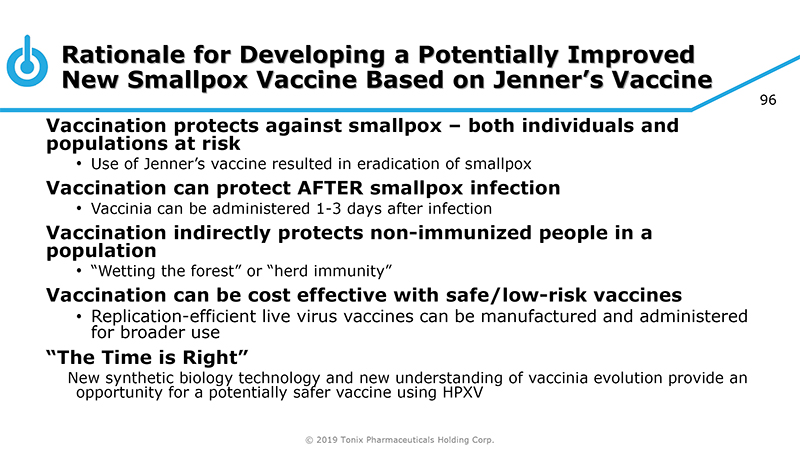
Rationale for Developing a Potentially Improved New Smallpox Vaccine Based on Jenner’s Vaccine 96 Vaccination protects against smallpox – both individuals and populations at risk • Use of Jenner’s vaccine resulted in eradication of smallpox Vaccination can protect AFTER smallpox infection • Vaccinia can be administered 1-3 days after infection Vaccination indirectly protects non-immunized people in a population • “Wetting the forest” or “herd immunity” Vaccination can be cost effective with safe/low-risk vaccines • Replication-efficient live virus vaccines can be manufactured and administered for broader use “The Time is Right” New synthetic biology technology and new understanding of vaccinia evolution provide anopportunity for a potentially safer vaccine using HPXV © 2019 Tonix Pharmaceuticals Holding Corp.
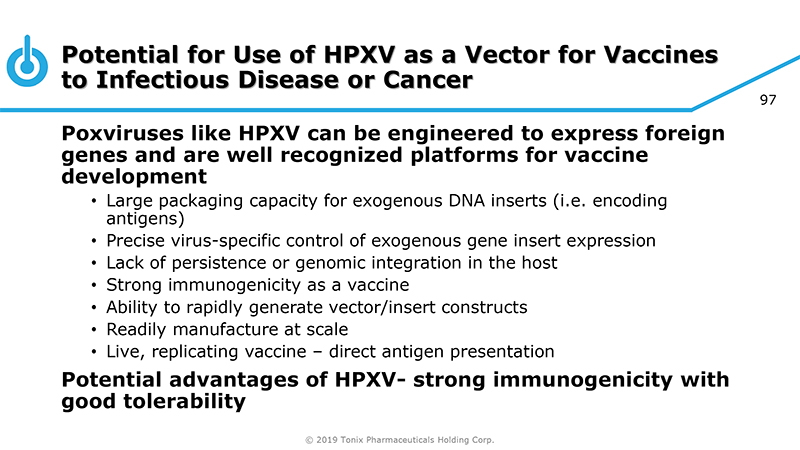
Potential for Use of HPXV as a Vector for Vaccines to Infectious Disease or Cancer 97 Poxviruses like HPXV can be engineered to express foreign genes and are well recognized platforms for vaccine development • Large packaging capacity for exogenous DNA inserts (i.e. encoding antigens) • Precise virus-specific control of exogenous gene insert expression • Lack of persistence or genomic integration in the host • Strong immunogenicity as a vaccine • Ability to rapidly generate vector/insert constructs • Readily manufacture at scale • Live, replicating vaccine – direct antigen presentation Potential advantages of HPXV- strong immunogenicity with good tolerability © 2019 Tonix Pharmaceuticals Holding Corp.
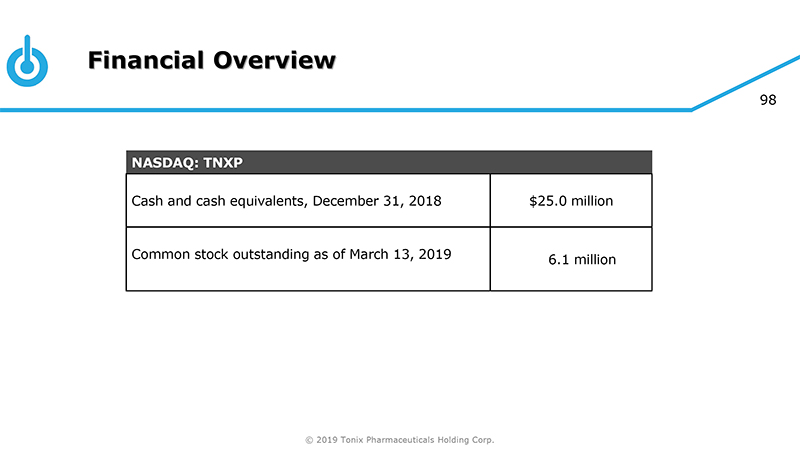
Financial Overview 98 NASDAQ: TNXP Cash and cash equivalents, December 31, 2018 $25.0 million Common stock outstanding as of March 13, 2019 6.1 million © 2019 Tonix Pharmaceuticals Holding Corp.
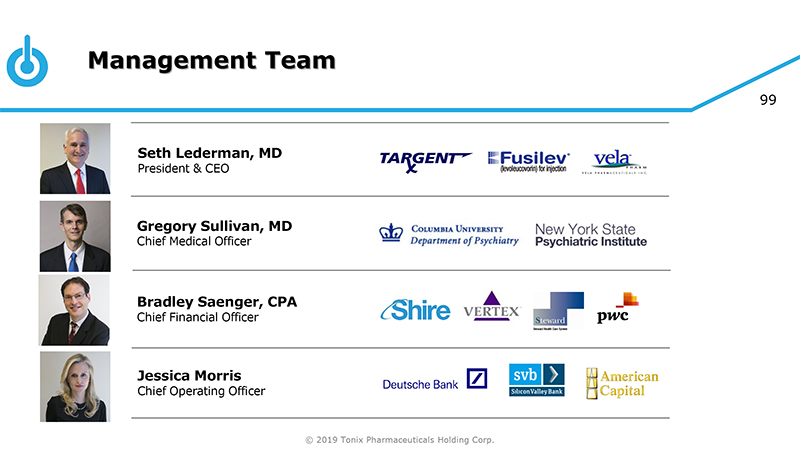
Management Team 99 Seth Lederman, MD President & CEO Gregory Sullivan, MD Chief Medical Officer Bradley Saenger, CPA Chief Financial Officer Jessica Morris Chief Operating Officer © 2019 Tonix Pharmaceuticals Holding Corp.
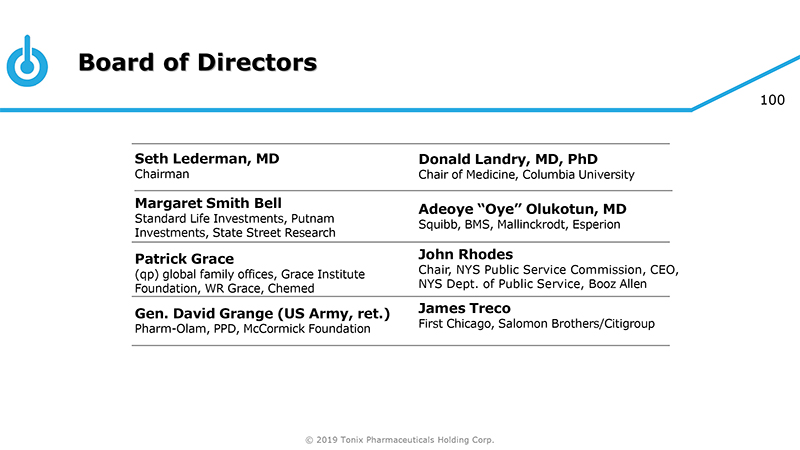
Board of Directors 100 Seth Lederman, MD Donald Landry, MD, PhD Chairman Chair of Medicine, Columbia University Margaret Smith Bell Adeoye “Oye” Olukotun, MD Standard Life Investments, Putnam Squibb, BMS, Mallinckrodt, Esperion Investments, State Street Research Patrick Grace John Rhodes (qp) global family offices, Grace Institute Chair, NYS Public Service Commission, CEO, Foundation, WR Grace, Chemed NYS Dept. of Public Service, Booz Allen Gen. David Grange (US Army, ret.) James Treco Pharm-Olam, PPD, McCormick Foundation First Chicago, Salomon Brothers/Citigroup © 2019 Tonix Pharmaceuticals Holding Corp.
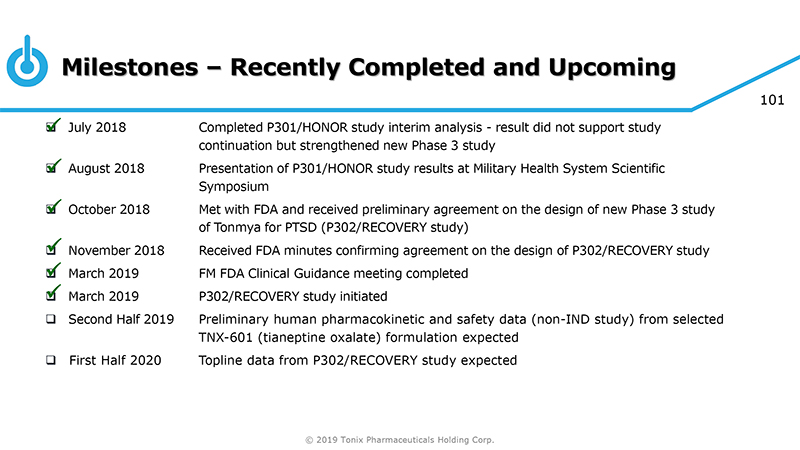
Milestones – Recently Completed and Upcoming 101 ✓July 2018 Completed P301/HONOR study interim analysis - result did not support study continuation but strengthened new Phase 3 study✓August 2018 Presentation of P301/HONOR study results at Military Health System Scientific Symposium✓October 2018 Met with FDA and received preliminary agreement on the design of new Phase 3 study of Tonmya for PTSD (P302/RECOVERY study)✓November 2018 Received FDA minutes confirming agreement on the design of P302/RECOVERY study ✓March 2019 FM FDA Clinical Guidance meeting completed✓March 2019 P302/RECOVERY study initiated ✓Second Half 2019 Preliminary human pharmacokinetic and safety data (non-IND study) from selected TNX-601 (tianeptine oxalate) formulation expected✓First Half 2020 Topline data from P302/RECOVERY study expected © 2019 Tonix Pharmaceuticals Holding Corp.
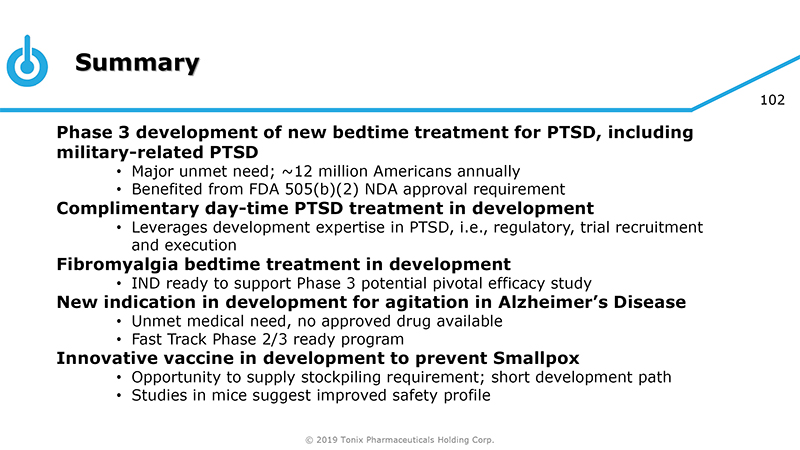
Summary 102 Phase 3 development of new bedtime treatment for PTSD, including military-related PTSD • Major unmet need; ~12 million Americans annually • Benefited from FDA 505(b)(2) NDA approval requirement Complimentary day-time PTSD treatment in development • Leverages development expertise in PTSD, i.e., regulatory, trial recruitment and execution Fibromyalgia bedtime treatment in development • IND ready to support Phase 3 potential pivotal efficacy study New indication in development for agitation in Alzheimer’s Disease • Unmet medical need, no approved drug available • Fast Track Phase 2/3 ready program Innovative vaccine in development to prevent Smallpox • Opportunity to supply stockpiling requirement; short development path • Studies in mice suggest improved safety profile © 2019 Tonix Pharmaceuticals Holding Corp.
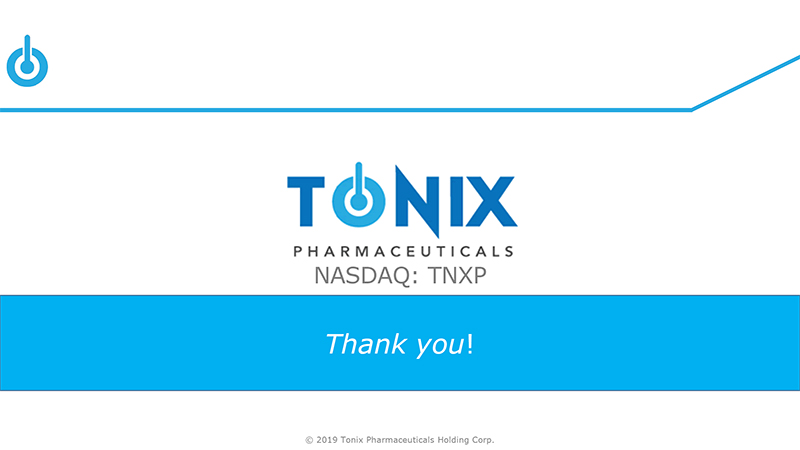
NASDAQ: TNXP Thank you! © 2019 Tonix Pharmaceuticals Holding Corp.